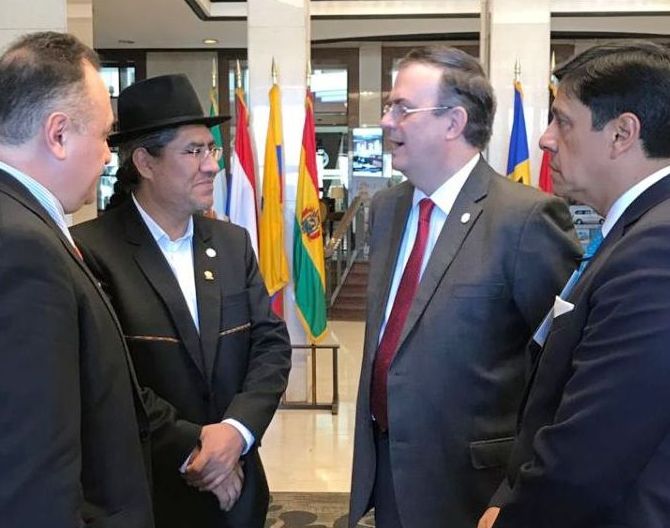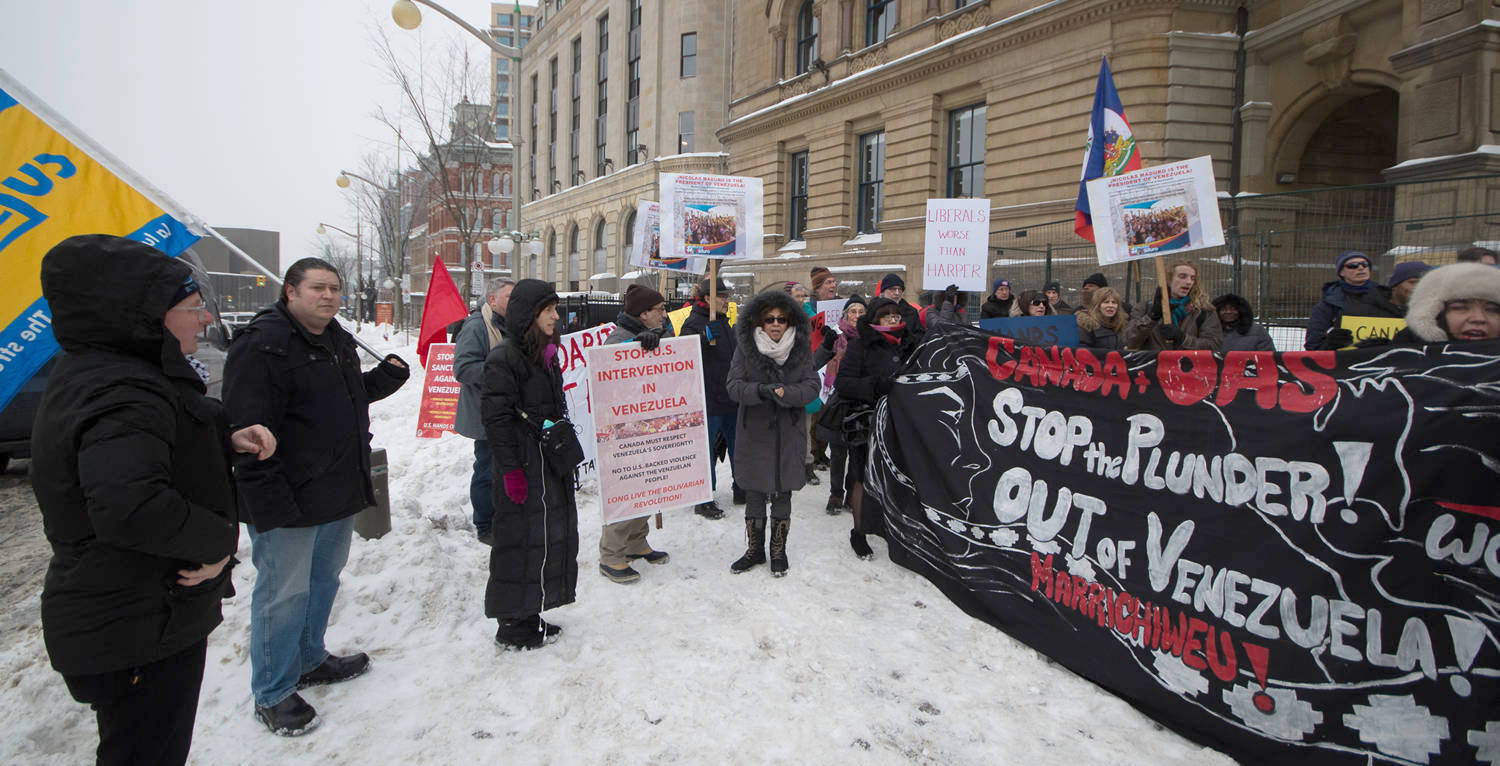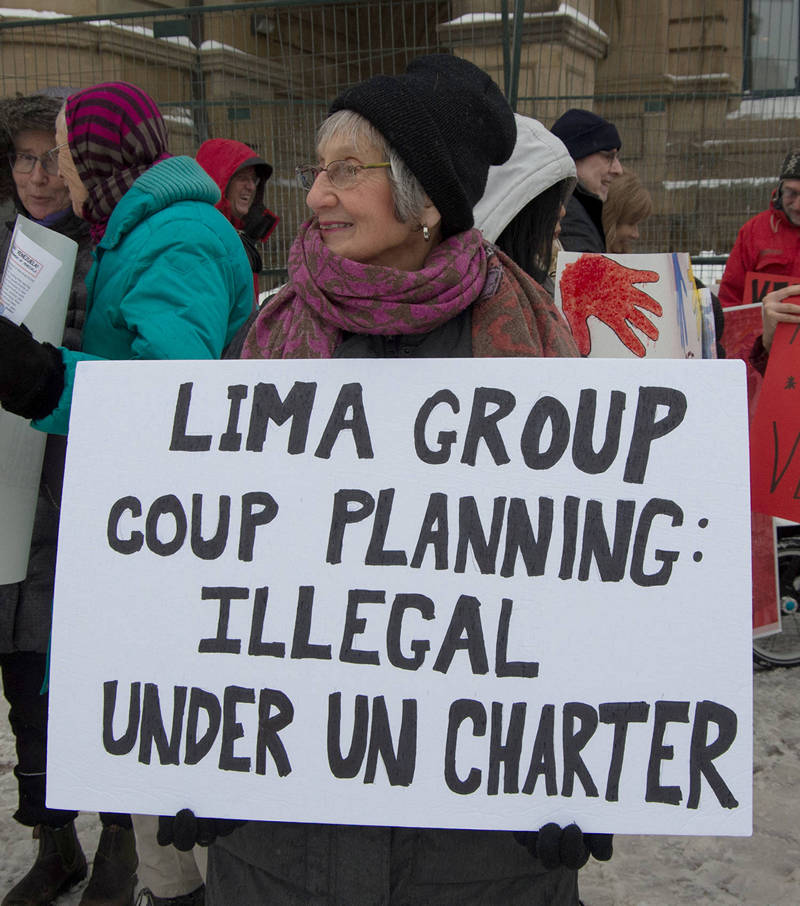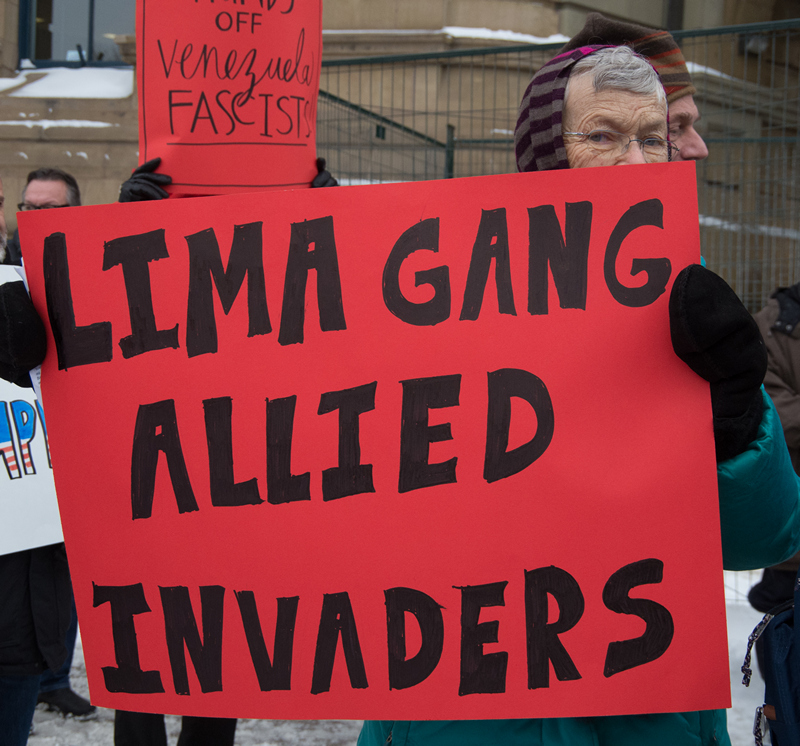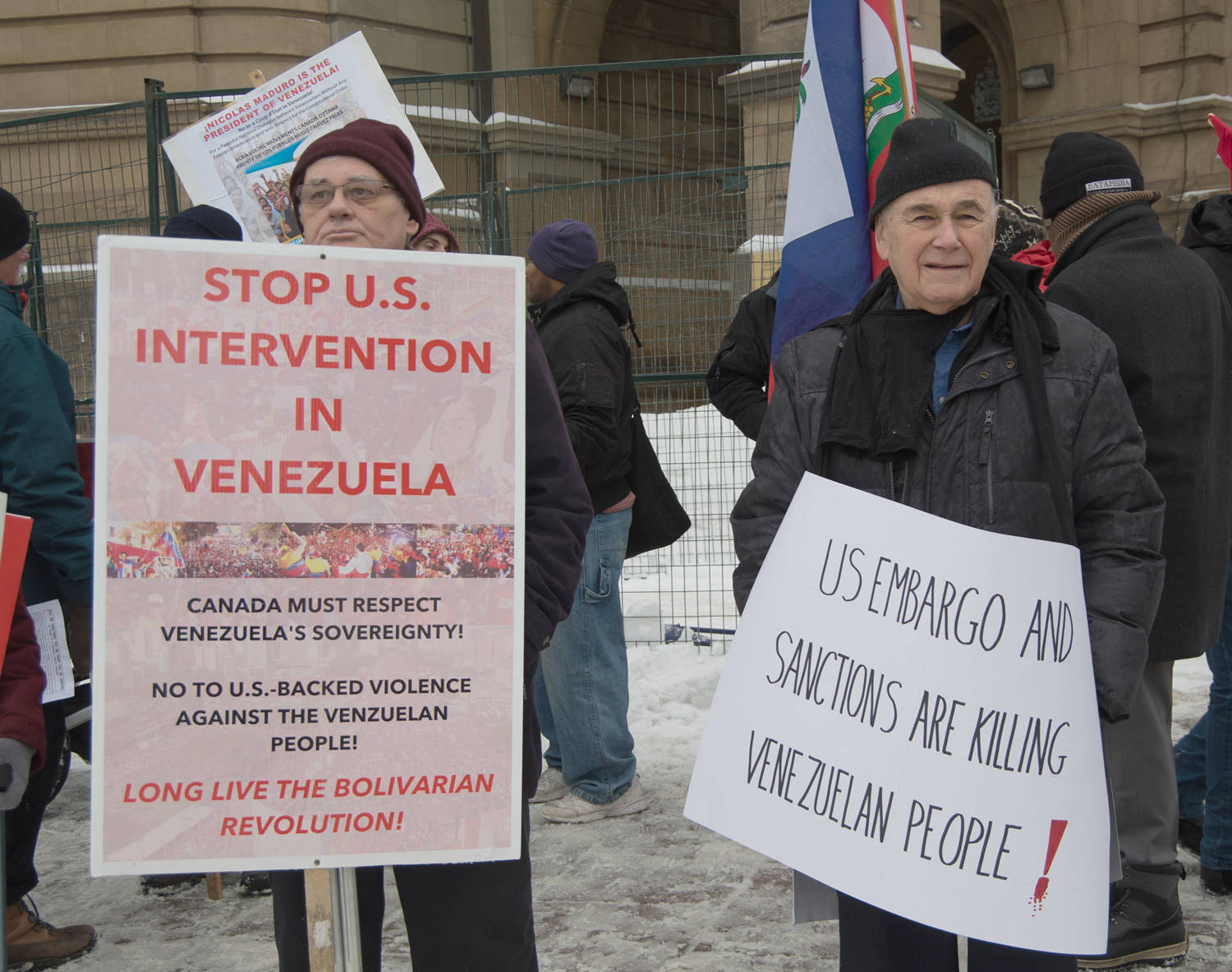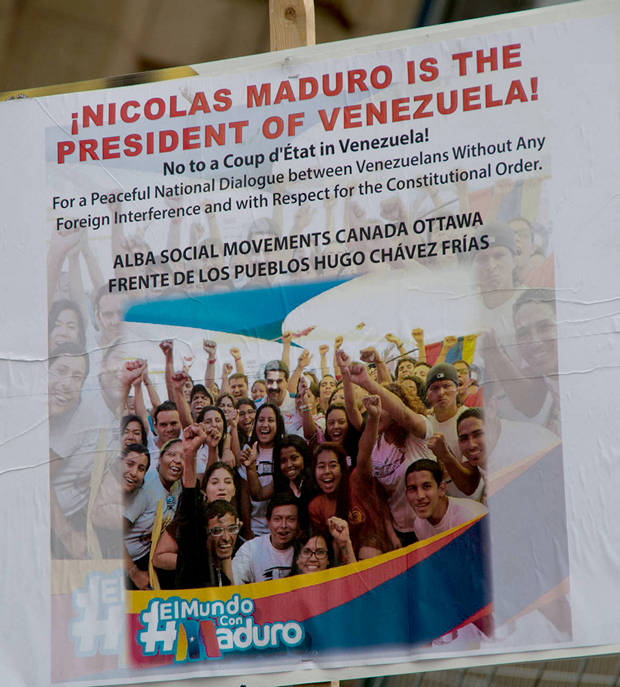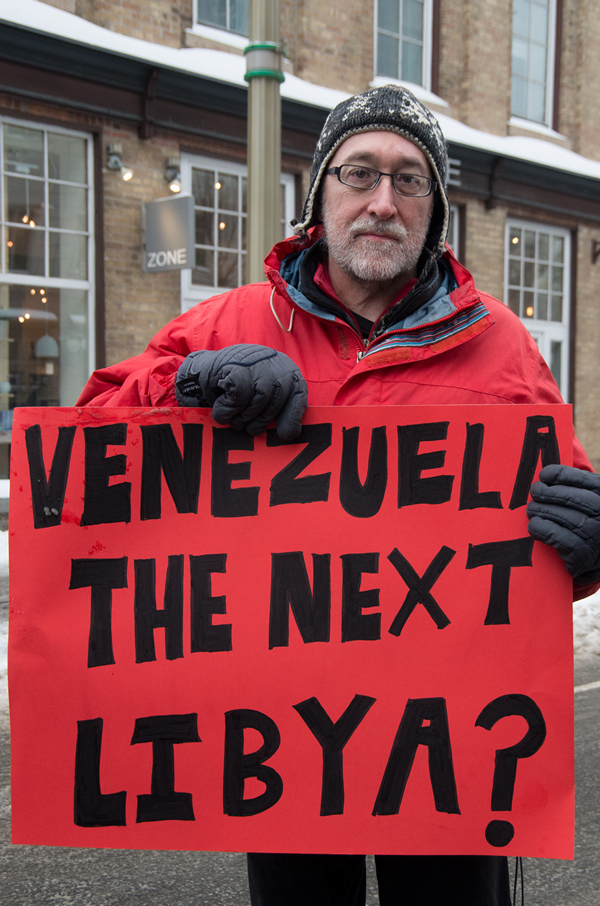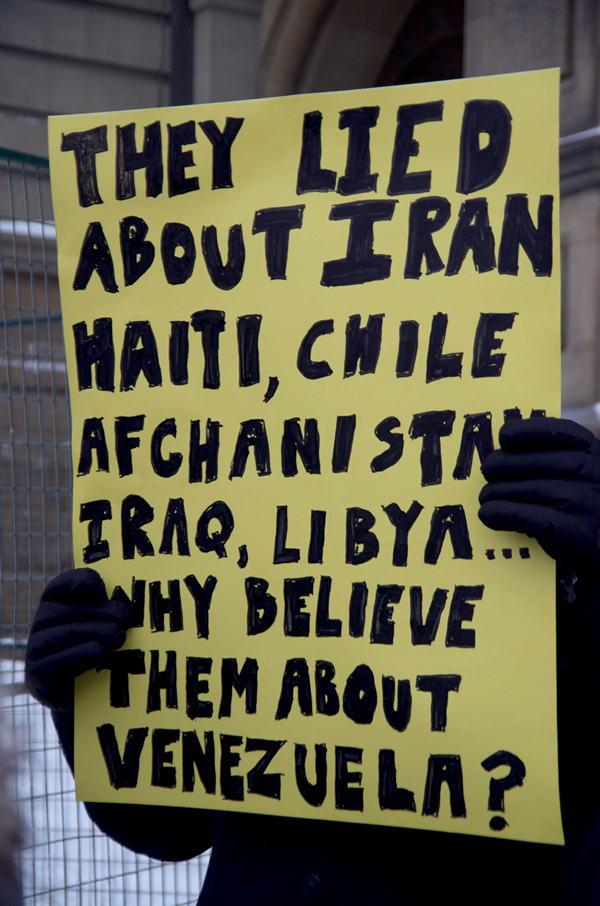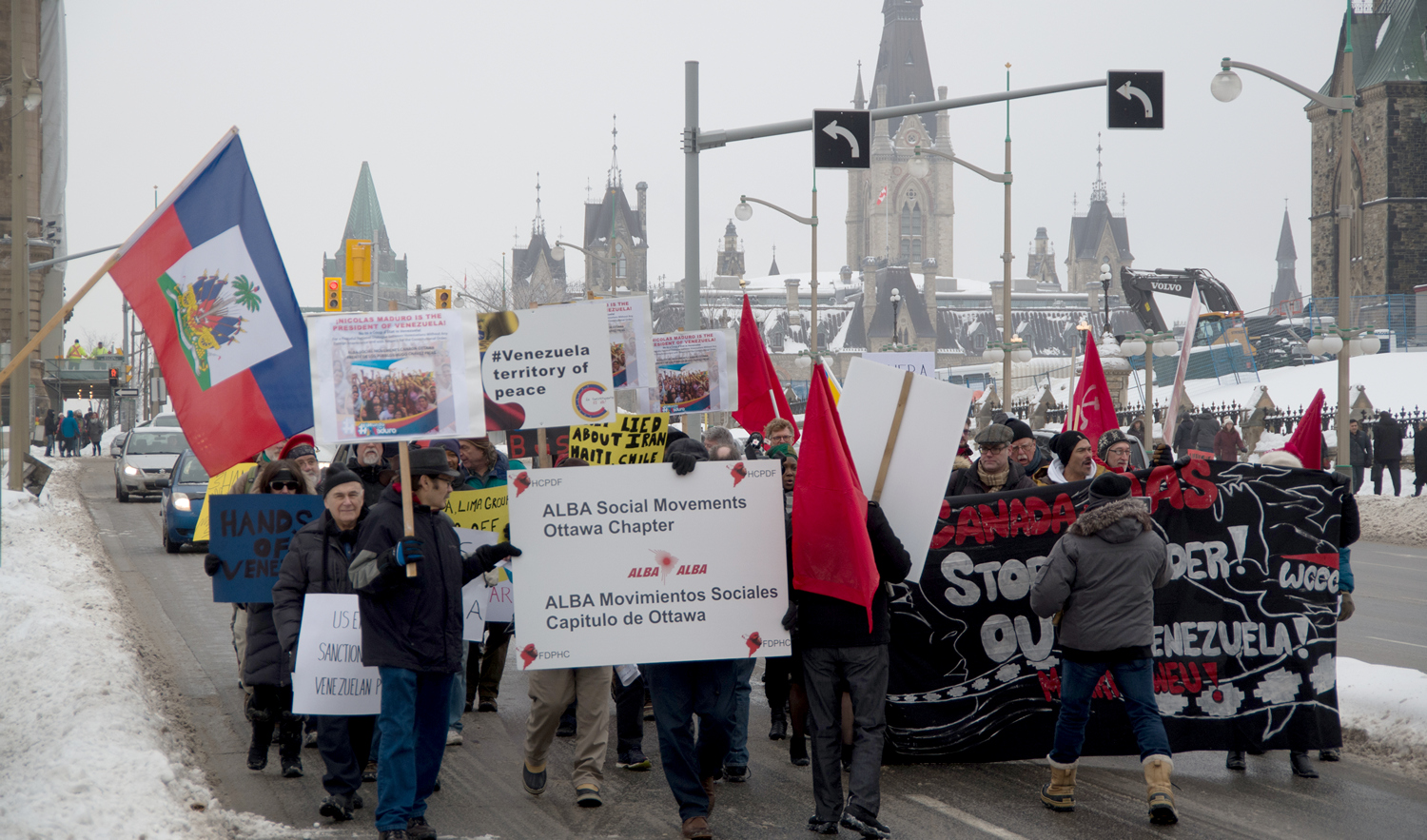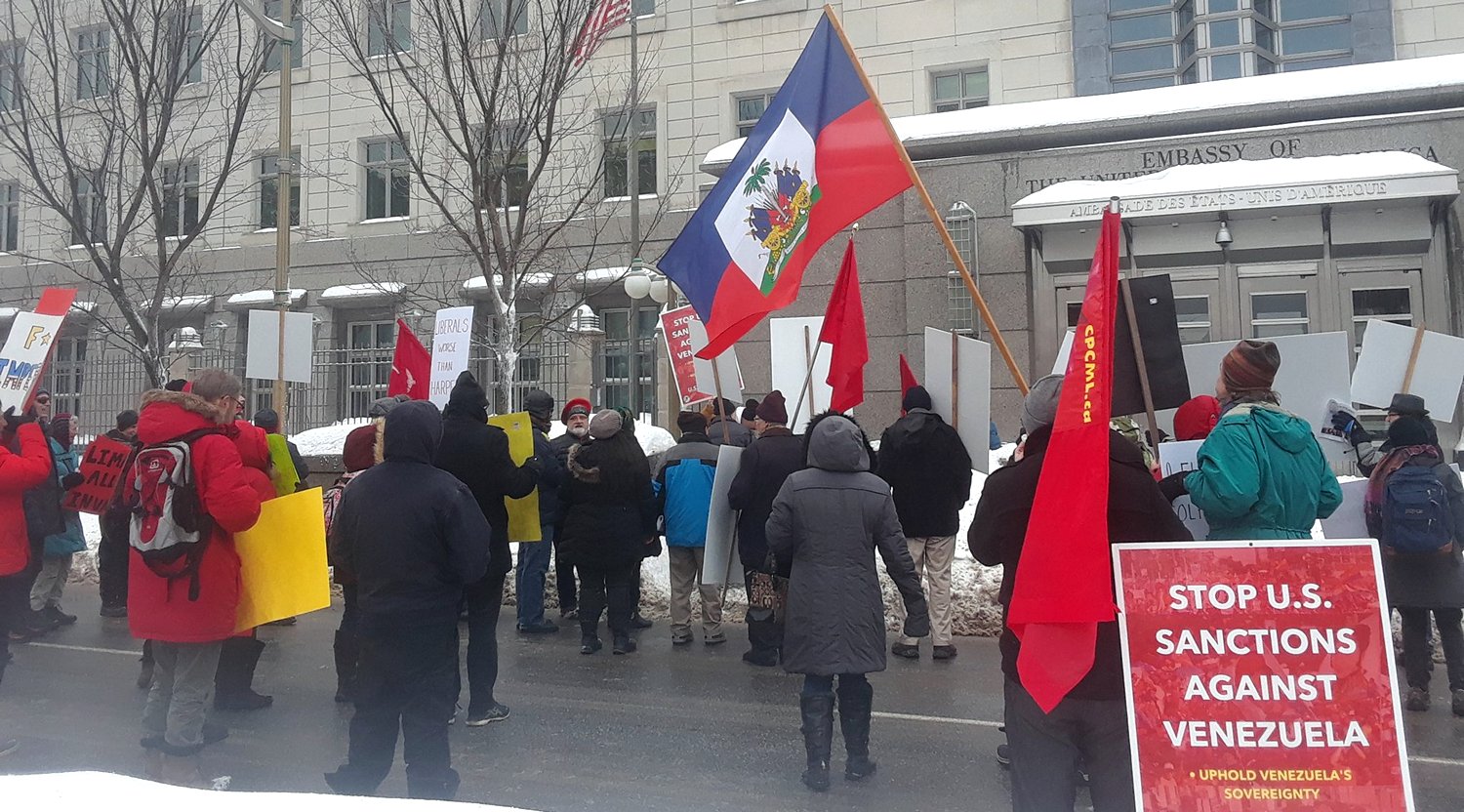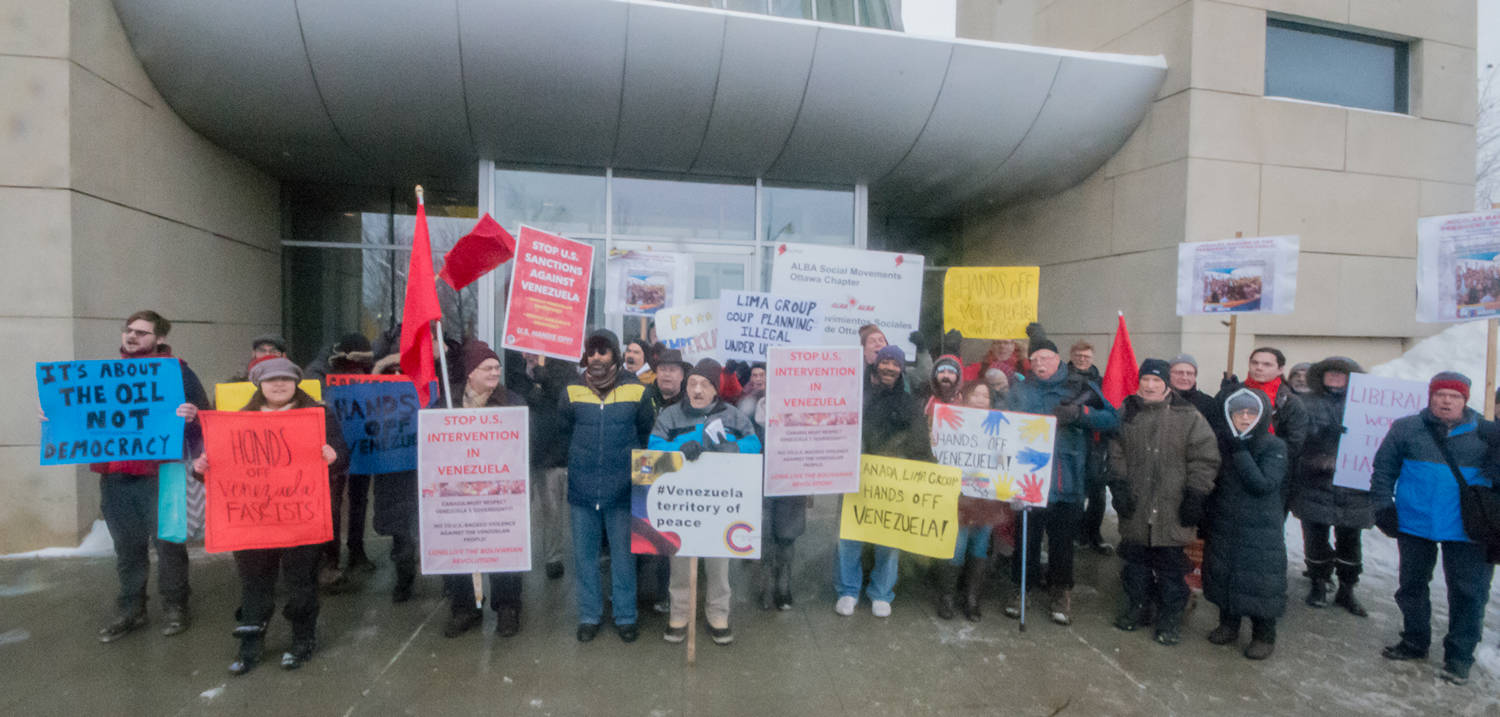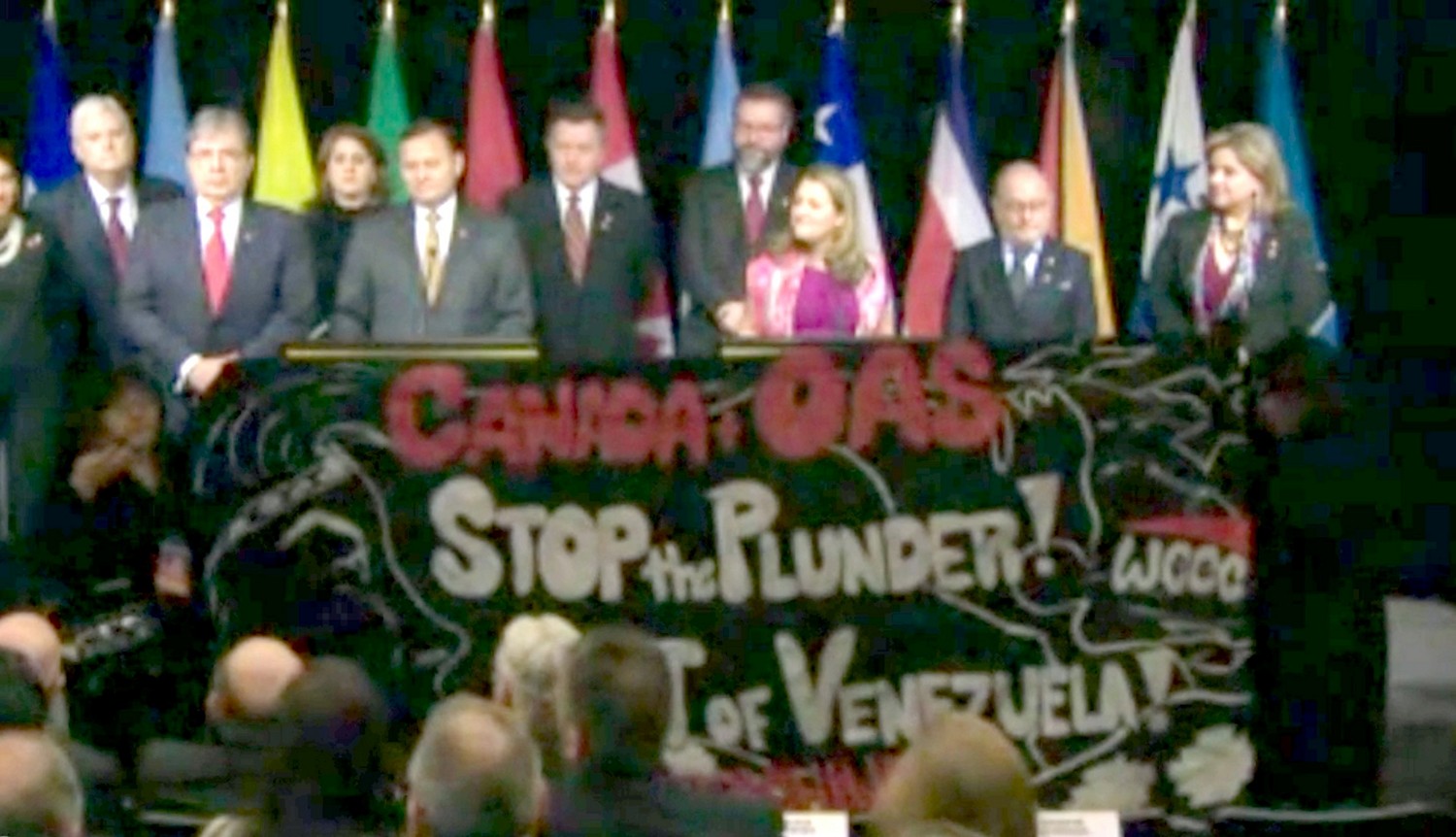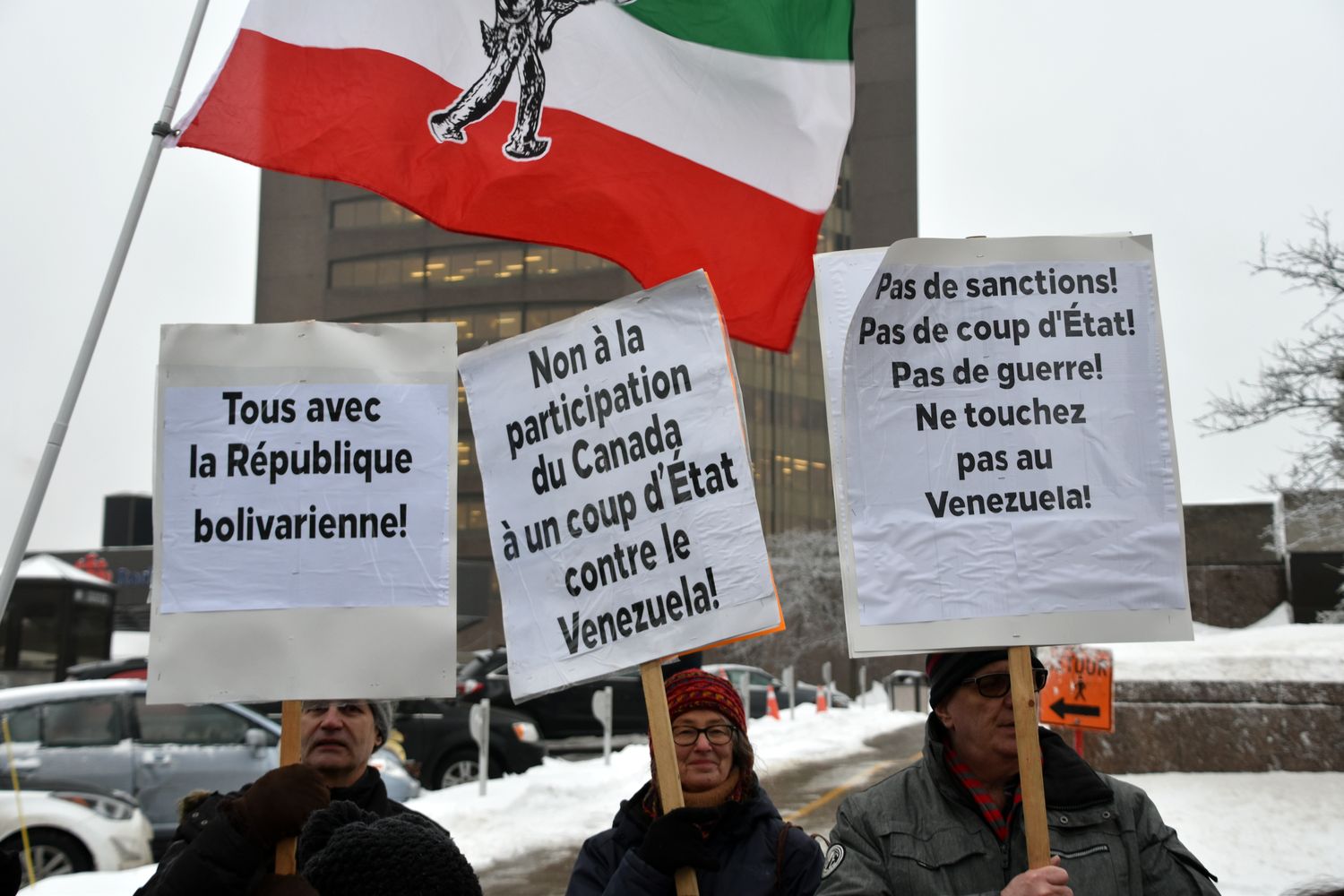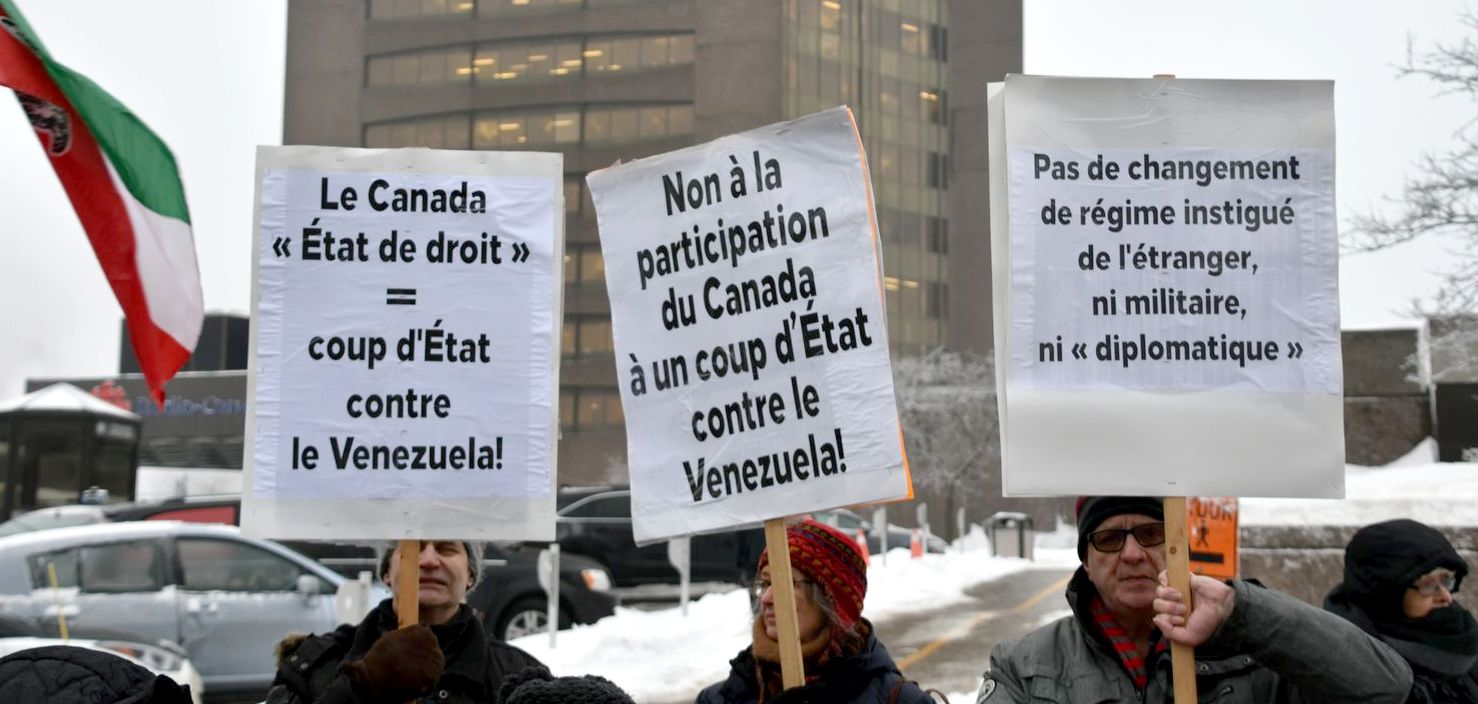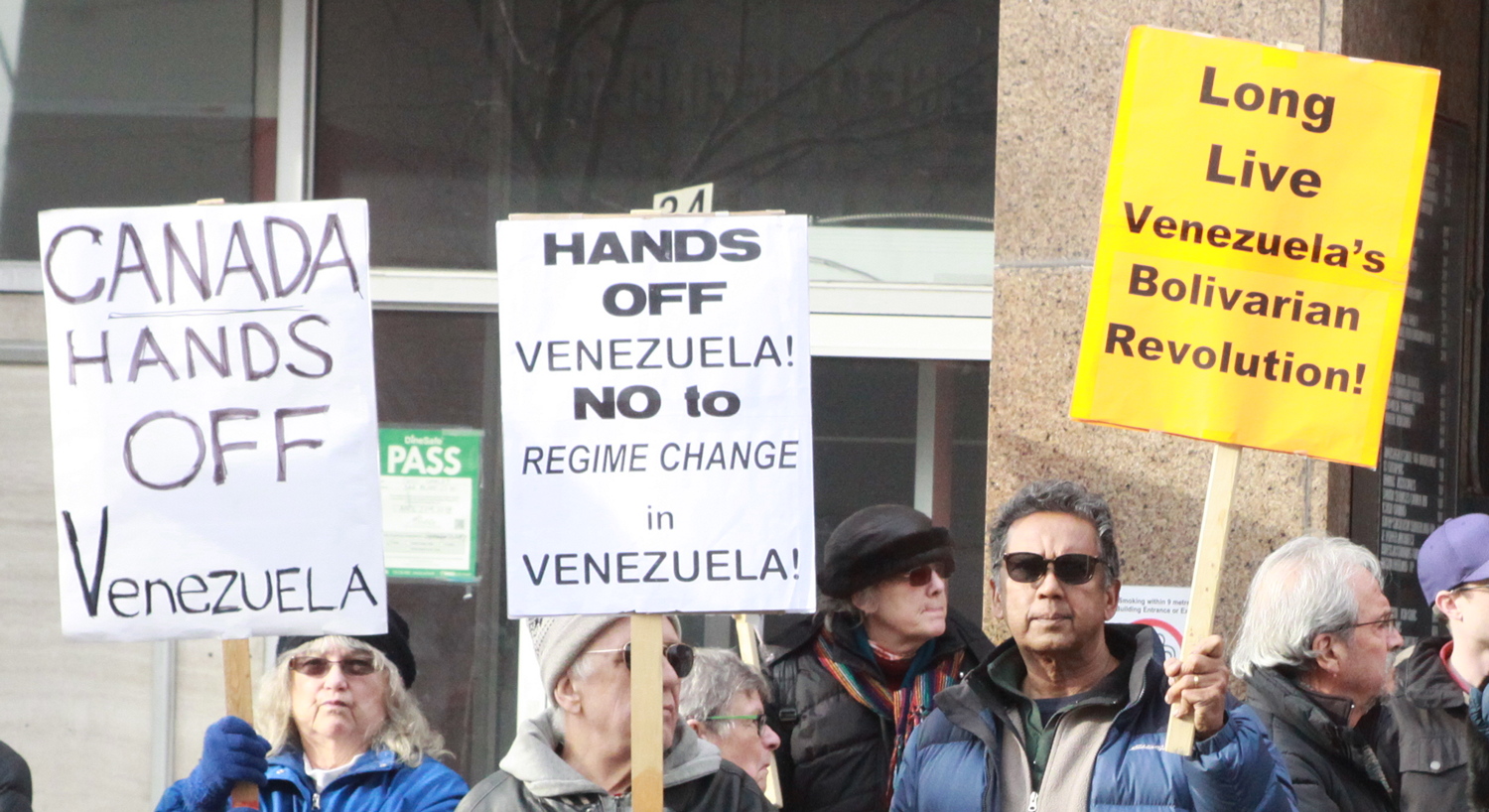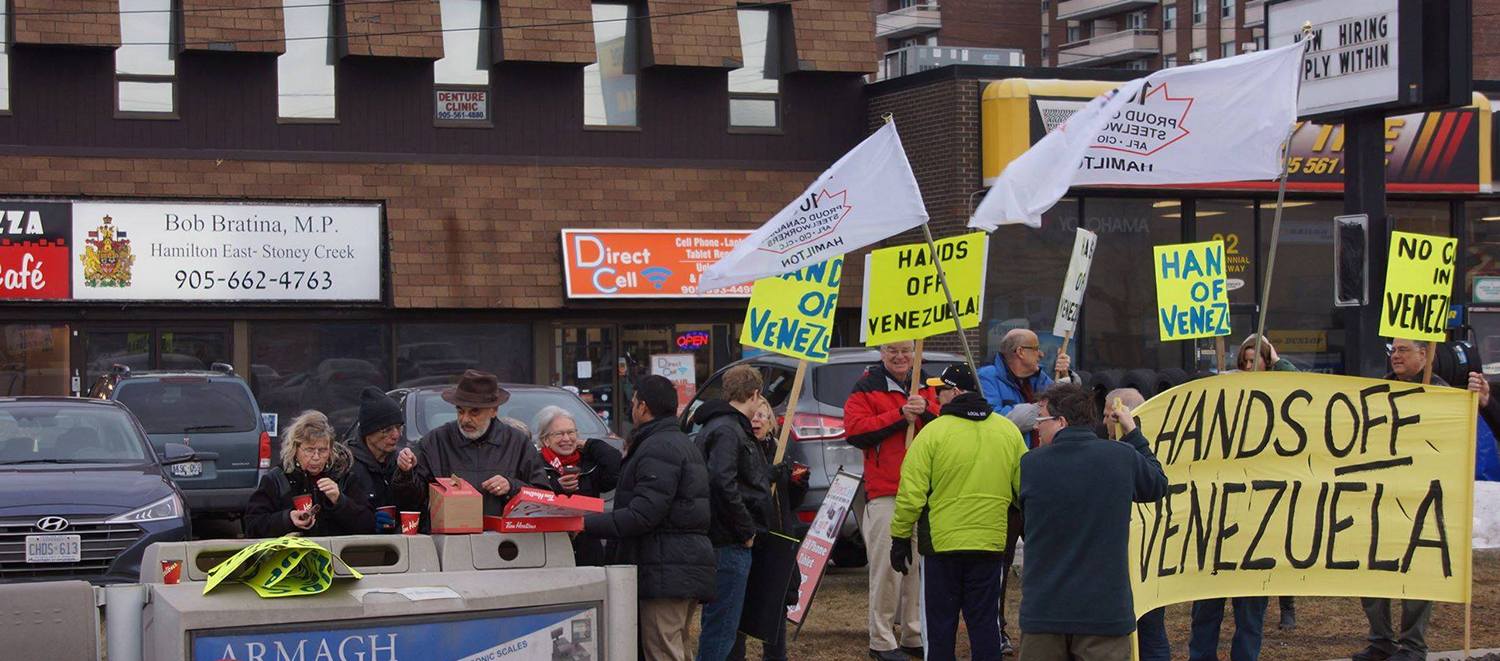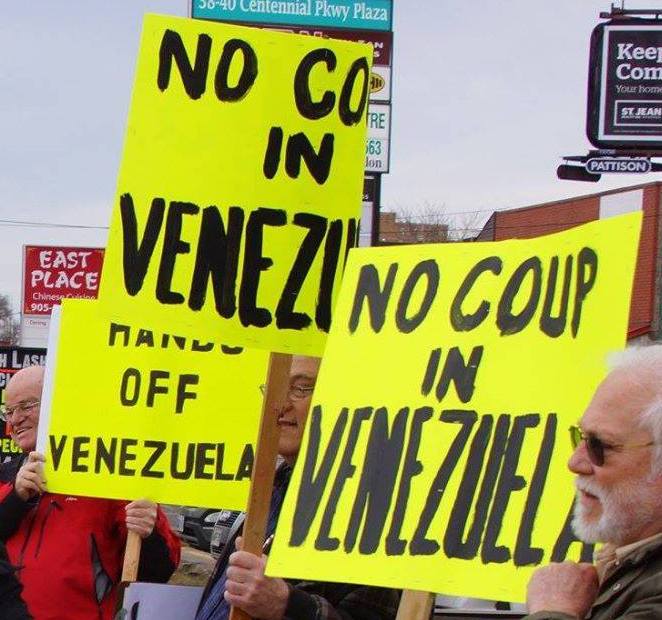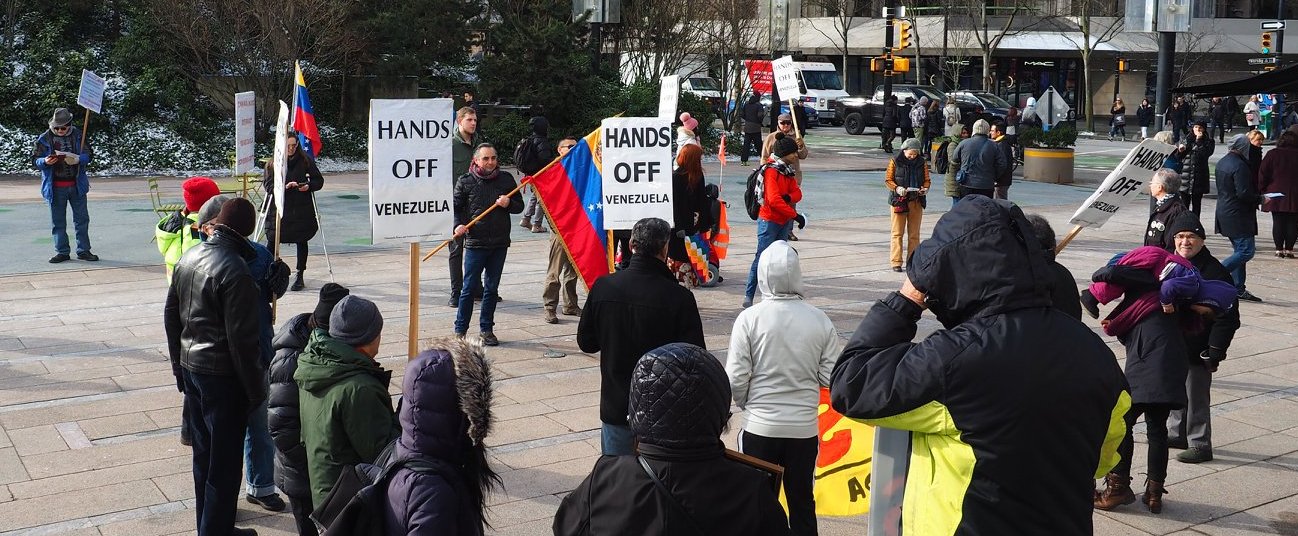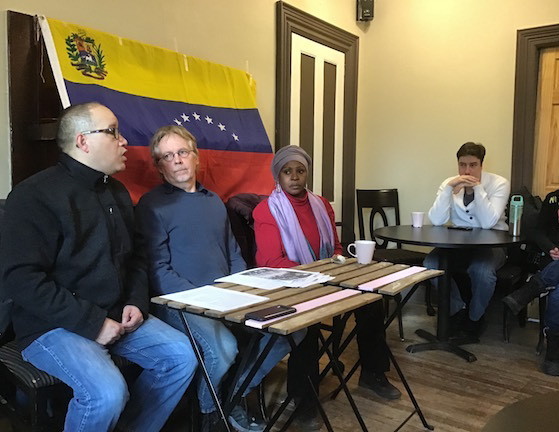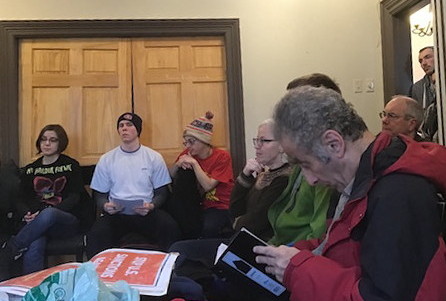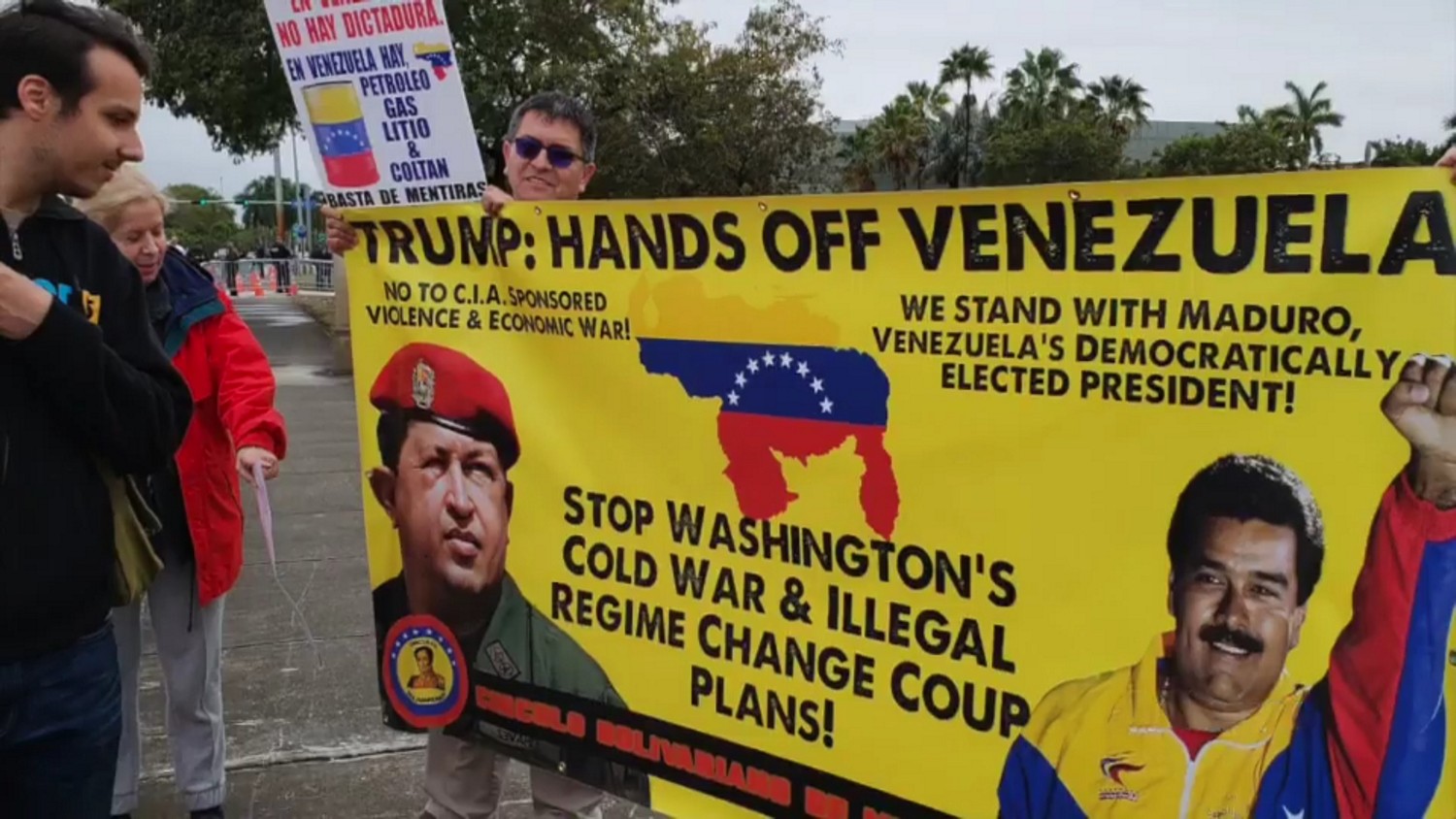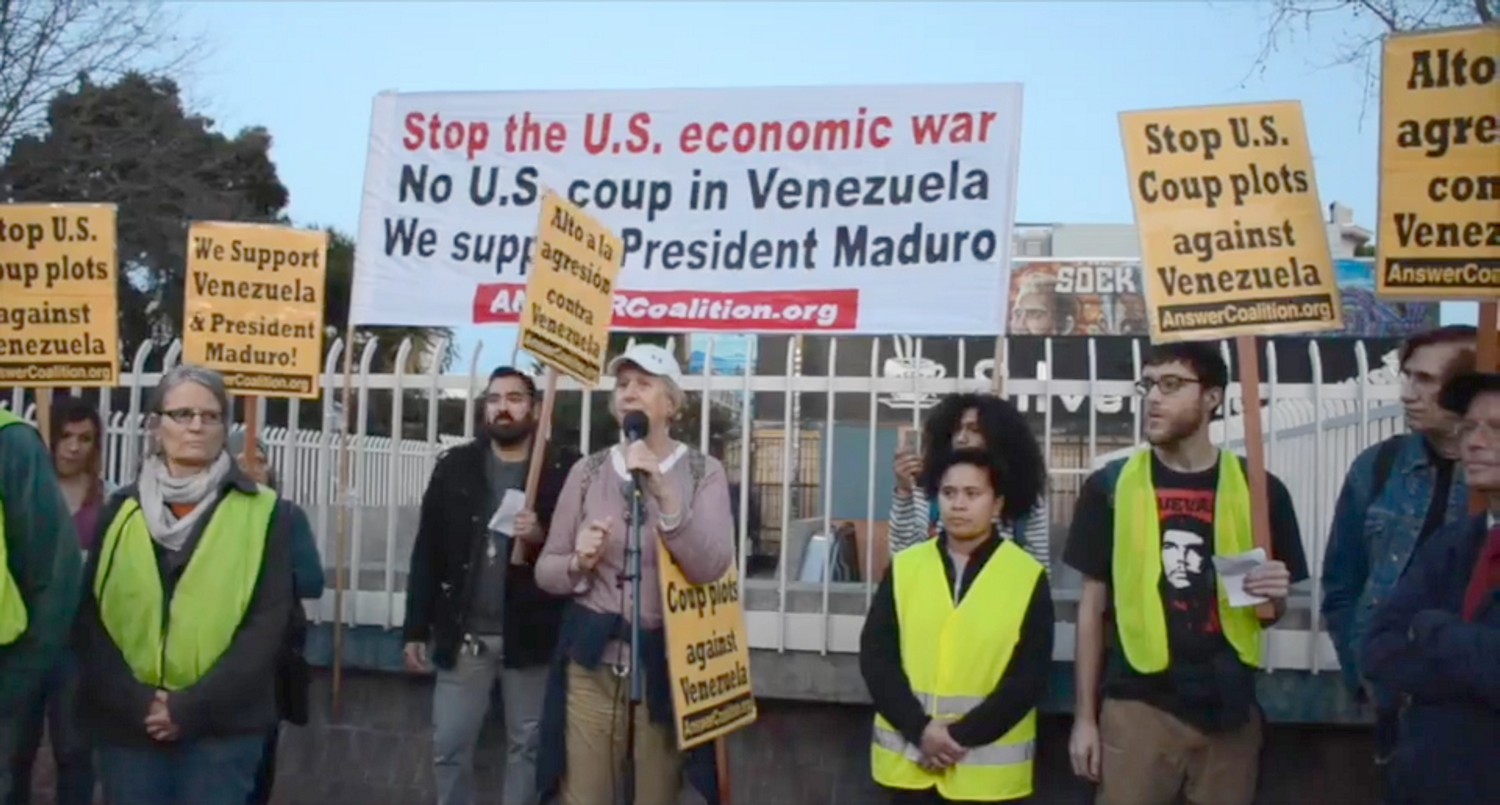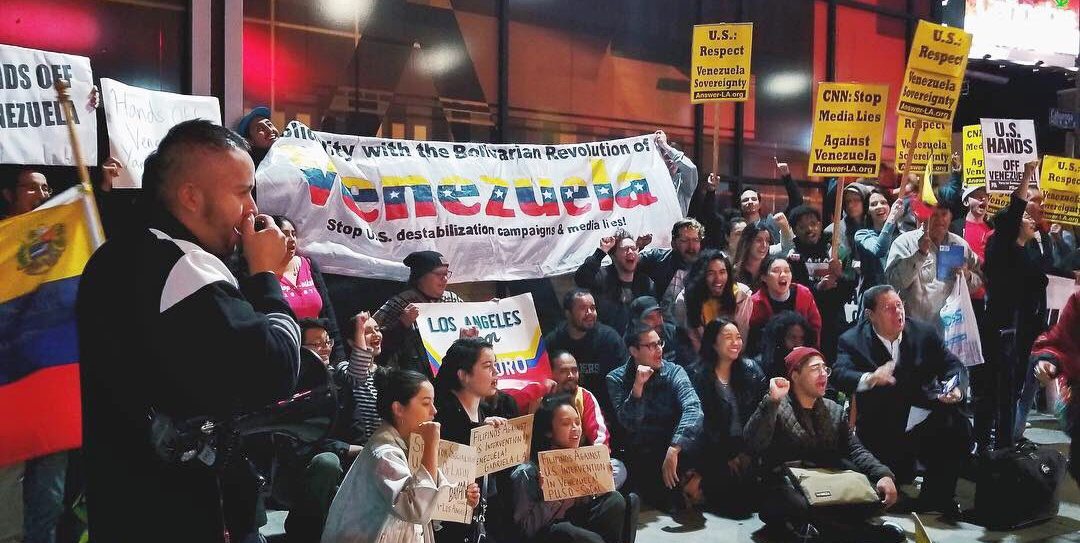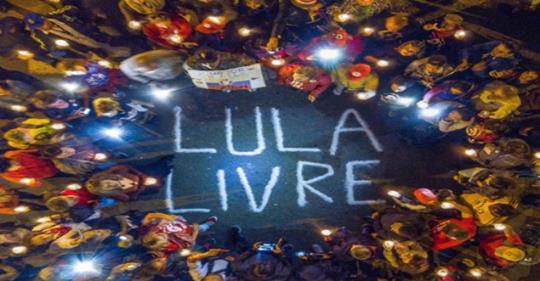
|
February 9, 2019 - No. 4 Matters of Concern to the Polity Talk of
Protecting
Elections from |
|
On February 4, Canada hosted an emergency ministerial meeting of the Lima Group, a gang of countries it is working with to try to force regime change in Venezuela. Held in Ottawa, it was the group's first face-to-face meeting since the self-proclaimed "interim president" of Venezuela, Juan Guaidó swore himself in. The U.S., to whom he owes his new position, is not ostensibly a member of the Lima Group, but recognized their puppet immediately with Canada and other members of the Lima Group following soon after. The meeting was attended as well by the U.S., several European Union countries and, notably, Julio Borges, introduced as Guaidó's appointee to the Lima Group, "representing Venezuela," and his designated representative in Canada, Orlando Viera-Blanco.[1]
Emphasis was placed on the meeting being about the international community supporting a peaceful transition to democracy through political and diplomatic means without the use of force, and getting immediate humanitarian aid to the Venezuelan people. The fact that it is in violation of all norms and principles of international law as contained in the UN Charter is hidden. Instead, Canada practices what its former ambassador to Venezuela, Ben Rowswell, calls a "uniquely Canadian approach to democracy promotion." He should know since he is one of the architects and star practitioners of this deceptively named policy which is in flagrant violation of democratic principles and the international rule of law.[2]
Opening remarks by Chrystia Freeland and Justin Trudeau set the tone for public consumption, with carefully chosen words repeated to suggest that what Canada and others in the room are up to is honourable and worthy of support, as opposed to what it really is -- brazen interference in the affairs of the Venezuelan people.
Talk of "the international community" supporting the hand-picked U.S. puppet Guaidó and of his having the support of "the Venezuelan people -- not some of the people, but all of them -- besides being untrue is to divert attention from the essence of the matter: the failure to uphold the right of nations to decide themselves their internal affairs without foreign interference.
The Lima Group meeting had the effrontery to assure Venezuelans they now have a "legitimate president" in Guaidó and a "constitutional path forward" to free and fair elections and that they can count on the governments which comprise the Lima Group to support them in the process of "recovering their democracy."
For effect, the proponents of this "uniquely Canadian approach to democracy promotion" always refer to Venezuela's president Nicolás Maduro in terms of his being a "dictator," who shows disregard for the rule of law and is merely concerned with "clinging to power." Assertions are made about the May 2018 presidential election being "illegitimate" and "anti-democratic," to shore up their claim that Nicolás Maduro is therefore an "illegitimate" president.
Freeland and Trudeau boasted about how Canada and all others in the Lima Group recognize the rule of law, the constitution of Venezuela and the free will of the people. Freeland praised Trudeau for having "worked incredibly hard for democracy and human rights in Venezuela" of late. Trudeau said Canada will always defend the rights of the people all over the world. He concluded with a thinly-veiled call for a coup d'état by saying "the international community" must immediately unite behind the Venezuelan people as they chart their path forward because "the moment for a democratic transition is now."
Lima Group Declaration
The meeting concluded with a 17-point declaration signed by the governments of Argentina, Brazil, Canada, Chile, Colombia, Costa Rica, Guatemala, Honduras, Panama, Paraguay, Peru. The 11 signatories:
- incorporated the self-proclaimed "interim president" Juan Guaidó into the Lima Group's ranks in representation of the "legitimate" government of Venezuela.
- agreed to recognize and work with representatives designated by the "government" of Juan Guaidó in their countries.
- decreed that any diplomatic or political initiative must "aim to support the constitutional roadmap presented to the National Assembly and interim President Juan Guaidó," lead to the "exit" of President Nicolás Maduro and allow for the holding of elections.
- called for dismissal of the current National Electoral Council and the appointment of all new members.
- demanded the release of all those imprisoned who the Lima Group deems to be political prisoners.
- called on the National Bolivarian Armed Forces to abandon Nicolás Maduro and shift their loyalty to the "interim president" Juan Guaidó.
- called on the armed forces not to impede the entry and transit of humanitarian assistance to Venezuelans, omitting any reference to the fact that this is intended to take place without seeking the consent of the authorities in that country in keeping with the policy of the International Red Cross and the United Nations. This official authority is the Maduro government but Canada, like the U.S., is bent on delivering the humanitarian cargo to wherever the parallel government and its "president in charge" Juan Guaidó say it should go -- a real provocation.
- call on "the international community" to enforce a full economic, financial and commercial blockade against Venezuela and seize its international assets -- the very tools the U.S., Canada and the EU have already employed to try and strangle Venezuela economically. This flagrant violation of international law is a deliberate attempt to turn the people against their government. Intensifying the blockade is intended to increase that pressure by punishing the people even more. A massive social media campaign features photographs said to be truckloads of U.S. "aid" or whatever else the trucks are carrying into the country claiming the Maduro government is blocking them. Photos flashed around the world happen to be of a bridge on the Colombia-Venezuela border that has never been officially opened for use since it was completed in 2016, and does not have customs, immigration or health inspection stations set up. There are two other functioning bridges in the area. But that information is never part of the "story."
Creating a humanitarian crisis and then blaming the official authorities of a sovereign government for blocking humanitarian aid is the method that was used to justify NATO bombing of Yugoslavia to dismember that country twenty years ago, and subsequently Libya, with disastrous consequences. It was also tried in Syria but failed. The Maduro government has the right to secure and exercise control over who and what enters its territory.
- In conclusion, in what can only be taken as a bad joke after everything on the list, the Declaration ends saying: "Finally, they [the signatories] reiterate their support for a process of peaceful transition through political and diplomatic means without the use of force."[3]
Claiming diplomatic means to secure regime change versus the use of force allegedly distinguishes the Canadian way from that of the United States. The fact that these alleged diplomatic means precede the use of force by providing it with a humanitarian justification are not to be discussed. Far from being a unique approach to democratic promotion, Canada is an appeaser of the use of force to achieve regime change. To call it "democracy promotion" is a farce.
The architect of this policy Ben Rowswell says Canada's "unique approach" is based on three core principles that can be seen in Canada's policy towards Venezuela. The first of these he says was revealed in Chrystia Freeland's call on the government of Nicolás Maduro to "respect the sovereignty of the people." He says the principles are:
1. Sovereignty rests with the citizens of a
country,
not the
governments that rule them
2. The initiative for restoring
democracy must come from the people of that country
3.
International support for democratic aspirations is best
delivered collectively
Canada has been quoting these "principles" since the end of the bi-polar division of the world to violate the rule of law and appease the U.S. imperialists in their striving for domination. By condoning methods said to be about collective security which by-pass the UN and international rule of law they have concocted other alleged principles such as "Canada's Human Security Agenda" and "humanitarian intervention" that also claimed state sovereignty was superceded by citizen sovereignty. It was used to justify NATO's illegal war of aggression against Yugoslavia. Then came Canada's "responsibility to protect" used to carry out a coup in Haiti in 2004 against the government of President Jean-Bertrand Aristide and to launch NATO's war of destruction on Libya in 2011.
Clearly a similar logic is at play in Canada's attempt to erect itself as the guardian of Venezuela's constitution to justify the installation of an illegal parallel "presidency" and "government" under foreign tutelage. To usurp the powers of Venezuela's constitutional government in the name of championing "the sovereignty of the people" is a telling example of Canada's claim to be a "rule of law country."
Canadian vs. U.S. "Democracy Promotion"
Rowswell claims that U.S. democracy promotion under Donald Trump has been strikingly different to Canada's, with Trump consistently and recklessly boasting about his willingness to use military force to get the outcome he wants in Venezuela. He says the U.S. approach violates popular sovereignty because it does not "allow citizens to lead their return to democracy" which we are to believe Canada's "unique approach to democracy promotion" does. He illustrates this by saying U.S. Vice President Mike Pence "stole the limelight" by calling on Venezuelans to pour into the streets on January 23, the anniversary of their 1958 democratic revolution, when they were already planning to do that. All that "pointless unilateral statement accomplished," he said, "was to prompt international media to misunderstand who held the initiative in the mass protests that emerged."
Rowswell says this is not an auspicious time for the U.S. to be promoting democracy outside its borders. The time has come to acknowledge that Canada has its own unique way of doing democracy promotion and that "We must not shy away from distinguishing ourselves from the U.S. whose commitment to democracy has wavered."[4] The fact that Canada has been deploying its "democracy promotion" around the world and particularly in Venezuela ever since Hugo Chávez was president provides some insight into that history.
The reference point which determines whether Canada's policy is democratic or not in terms of adhering to democratic principles and the international rule of law is determined against the principles and norms enshrined in the Charter of the United Nations and the resolutions and declarations that flow from it, which all countries are duty-bound to abide by. When that is done Canada's "unique approach to democracy promotion" amounts to little more than Canada's good cop, to the U.S. bad cop routine for how to effect regime change.
Notes
1. Orlando Viera-Blanco has been nominated by Juan Guaidó as Venezuela's ambassador to Canada. Viera-Blanco is a Canadian resident and lawyer who the opposition-controlled National Assembly of Venezuela had previously named as an "external adviser" to its Committee on Foreign Affairs and Sovereignty. He is a former president of the Canadian Venezuelan Engagement Foundation, a group which claims to be "Venezuelans in exile" committed to defending the human rights of Venezuelans still living in the country via engagement with the Government of Canada. Venezuela has been without an Ambassador to Canada since December 25, 2017, when Foreign Minister Chrystia Freeland declared Wilmer Barrientos "no longer welcome in Canada." This was a retaliatory move by Canada following Venezuela's expulsion of Canada's then-Ambassador to Venezuela Craig Kovalik due to ongoing interference in Venezuela's internal affairs. Chargé d'affaires Luis Acuna presently heads Venezuela's diplomatic mission in Canada.
Viera-Blanco addressed the Parliamentary Subcommittee on International Human Rights on April 6, 2017, where he tried to make the case for what he called "an on-going coup d'état" in Venezuela, asserting that "everyone is now describing the situation as a rupture, or breakdown, of the constitutional order and a coup d'état." He also claimed that "changes to Venezuela's constitutional order" had led to the suffering of the Venezuelan people "for the past 18 years" -- in other words, since the election of Hugo Chávez to the Presidency of Venezuela that brought indisputably massive improvements to the Venezuelan people's social and living conditions. His "testimony" was a litany of half-truths, slanderous accusations and outright lies for the purpose of "proving" that the people of Venezuela are in dire straits, living through a humanitarian crisis and suffering widespread human rights abuses on a scale warranting urgent intervention against the country's government by "the international community." The aim was also to hide the many achievements of the Bolivarian Revolution in terms of human rights and in many other areas over the past 18 years based on its rejection of neo-liberal "solutions."
2. Ben Rowswell is currently the President of the Canadian International Council (CIC) which calls itself Canada's Foreign Relations Council. His CV includes being Canada's envoy to Iraq at the beginning of the U.S. occupation there in 2003, and heading NATO's Provincial Reconstruction Team in Kandahar at the height of Canada's military involvement in occupied Afghanistan.
He has also worked with the U.S. National Democratic Institute (NDI) which operates under the umbrella of the National Endowment for Democracy (NED) that was created to take on work previously done by the CIA related to the recruitment and funding of in-country agents to carry out destabilizing activities in countries targeted by the U.S. for regime change. A 2017 story in the Ottawa Citizen quotes Rowswell as saying one of the greatest satisfactions of his career was creating a unit at Foreign Affairs for "fostering democracy abroad."
Other jobs he has held include working as a Privy Council "international strategy" advisor to the governments of Jean Chrétien and Stephen Harper, and at the U.S. Center for Strategic and International Studies, a Washington DC-based think tank.
Most of Rowswell's professional education has been in the U.S. -- at Georgetown University's School of Foreign Service in Washington, DC (1989 to 1993) and some studies and other projects on such topics as democracy promotions and "colour revolutions" at Stanford University in California. He also did graduate studies at Oxford in London.
Rowswell has been a leading proponent of "digital
diplomacy,"
specializing in the use of social media to engage directly with
"civil society" bypassing their governments -- something he put
into practice with government opponents and "human rights
activists" in Egypt and Iran before landing the job of Canada's
Ambassador to Venezuela from 2014 to 2017. One of the Canadian
Embassy's main projects when he was the Ambassador to Venezuela
was cultivating links with and giving out awards to "human rights
defenders" in annual contests the embassy co-sponsored. In his
own words Rowswell said, "We became one of the most vocal
embassies in speaking out on human rights issues and encouraging
Venezuelans to speak out." A review of the winners reveals that
not a small number of the NGOs and individuals honoured and
rewarded with expense-paid trips around Venezuela and to Canada
to meet with "human rights" organizations and others, were ones
that typically cast the government of Nicolás Maduro in a
negative light.
3. "Lima Group Declaration,"
Global Affairs Canada, February 4, 2019.
4. "In Venezuela, Canada
Promotes
Democracy. The U.S. Does Not," Ben Rowswell, Globe and Mail, January 28,
2019.
Four-Phase Montevideo
Mechanism for
Peace and Dialogue in Venezuela
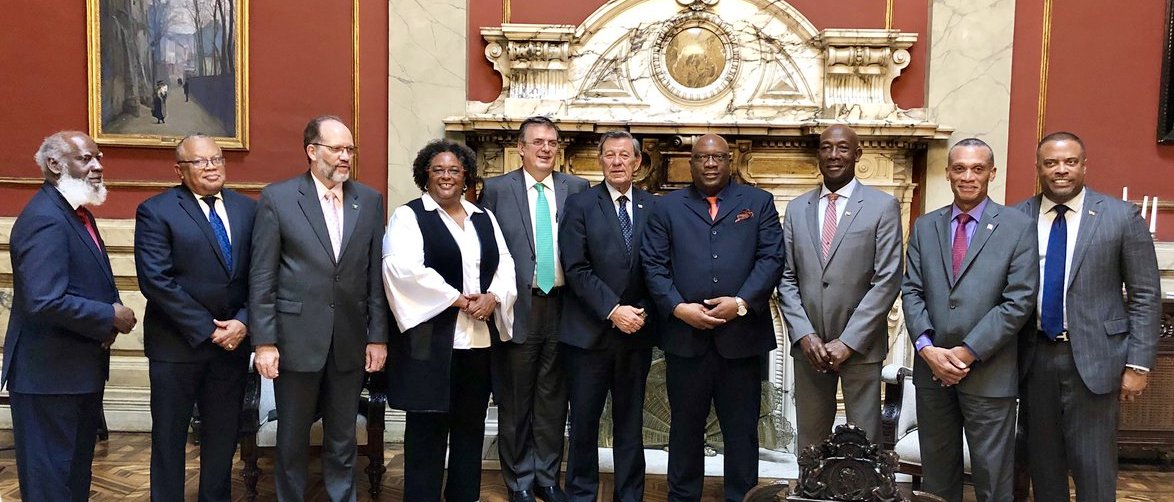
Delegations of Mexico, Uruguay and CARICOM in Montevideo,
February 6,
2019.
Venezuelan President Nicolás Maduro on February 6 gave "absolute support" to a four-phase plan designed by the countries of the Caribbean organized in CARICOM, along with Mexico and Uruguay, for Peace and Dialogue in Venezuela titled the Montevideo Mechanism. On February 7 a meeting was held in Montevideo co-hosted by Uruguay and the European Union and attended by representatives of eight European Union member states (France, Germany, Italy, The Netherlands, Portugal, Spain, Sweden and the United Kingdom) as well as Costa Rica, Bolivia and Ecuador, reported to be members of an EU-initiated International Contact Group (ICG) on Venezuela. The aim of the meeting was said to be to explore ways and means of fostering a negotiated, political settlement to the crisis in Venezuela without the use of force.
|
|
While most countries in the ICG have recognized Juan Guaidó as Venezuela’s “interim president” and went into the meeting calling for elections to be held “as soon as possible,” Mexico, Uruguay and CARICOM went with a proposal of their own titled the Montevideo Mechanism, which they said was guided by the principles of non-intervention, legal equality of states, peaceful resolution of the controversies, respect for human rights and self-determination.
As could be expected, the meeting was unable to reach a consensus. The EU-led group of countries issued a statement in the name of the ICG conditioning a resolution to the crisis on the holding of elections, and humanitarian aid and a technical mission being sent into Venezuela without seeking the consent of the government of that country, which is a violation of international law. Mexico and CARICOM took the high road and stuck to their guns, as did Bolivia. They did not conciliate with the EU-led attempt to set preconditions for any negotiations and its attempt to dictate matters that belong solely to the Venezuelan people, such as the holding of elections. Uruguay on the other hand signed the ICG declaration. At the meeting, Bolivia’s Foreign Minister Diego Pary formally signed on to the Montevideo Mechanism on behalf of his government and urged those who had imposed illegal sanctions against Venezuela, including the EU, to lift them, saying the blockade against Venezuela is what is affecting the economy.
A further meeting is planned in early March.
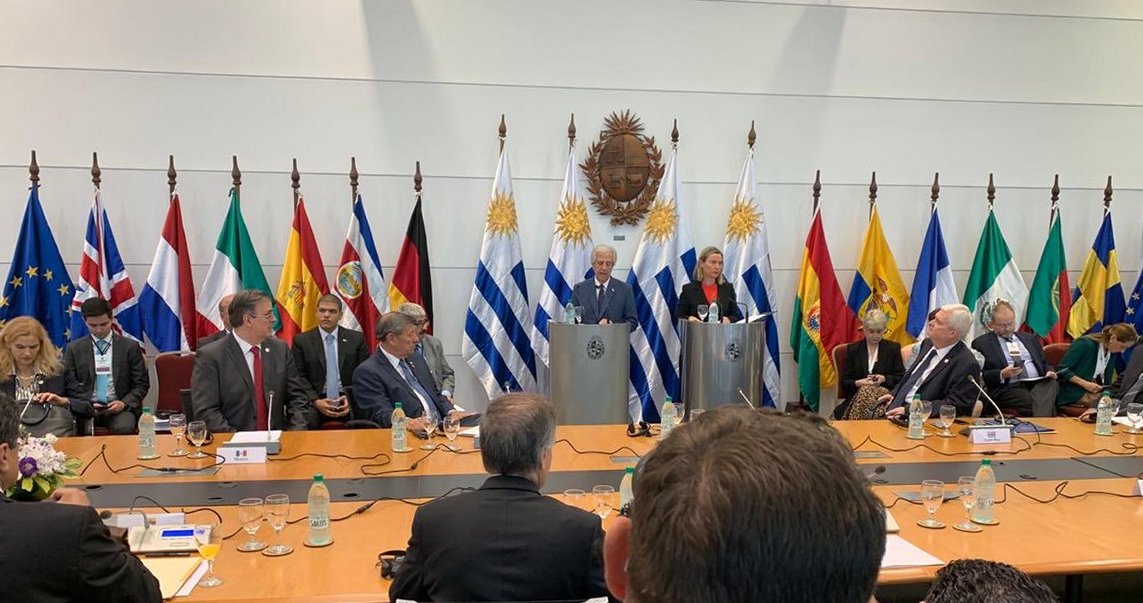
Meeting on Venezuela, Montevideo, Uruguay, February 7, 2019
(@EmbaMexUruguay)
Text of Montevideo Mechanism
The governments of Mexico, Uruguay and CARICOM, in response to the call of the Secretary General of the United Nations, Antonio Guterres, agree that the most appropriate way to address the complex situation that prevails in Venezuela is through dialogue for a negotiation, from a position of respect for International Law and Human Rights. The historical stance of our countries is and will always be to privilege diplomacy over other alternatives, as it is the only way to achieve sustainable, legitimate and effective peace and stability.
Therefore, we propose the Montevideo Mechanism, based on our legitimate interest and willingness to assist the Venezuelan people and the actors involved find a solution to their differences. This initiative is offered to the Venezuelan actors as a peaceful and democratic alternative that privileges dialogue and peace, with the aim to create all necessary conditions for an inclusive, comprehensive and lasting solution.
This Mechanism, evidence of an active, proactive and conciliatory diplomacy to bring the disputing parties closer together, avoid conflict and violence, is guided by the principles of non-intervention, legal equality of the States, peaceful solution of the controversies, respect for human rights and self-determination.
Based on the experience of the signatory countries in processes of mediation and peaceful conflict resolution, we propose to establish a four-phased process, which will develop during a reasonable period of time, previously agreed by the parties:
1. Dialogue Phase: Creating conditions for direct contacts among the actors involved, in an environment of security.
2. Negotiation Phase: Strategic presentation of the results of the previous phase to the counterparts, seeking to find common ground and areas of opportunity to allow the relaxation of positions and identify potential agreements.
3. Commitments Phase: Construction and subscription of agreements based on the results of the negotiation phase, with the characteristics and timeframe, previously agreed upon.
4. Implementation Phase: Materialization of the commitments assumed in the previous phase with the international accompaniment.
The subscribers of this statement agree that the complexity of the circumstances should not be a reason to dismiss the diplomatic channels for dispute settlement, and reiterate our decision to help restore the tranquility of the Venezuelan people, through dialogue and peace, reducing tensions between political forces and avoid the threat or use of force.
Likewise, our governments reiterate their concern about the serious humanitarian situation and respectfully exhort all parties to guarantee the validity of the Human Rights and the freedoms established in the UN Charter, subscribed by Venezuela.
This Mechanism is our proposal to guarantee a peaceful and democratic solution that prevents an escalation of violence. In the event that the parties decide to communicate, we would invite Mrs. Rebeca Grynspan, former Vice-President of Costa Rica and current Ibero-American Secretary General, Mr. Enrique Iglesias and Mr. Bernardo Sepúlveda, ex Foreign Ministers of Uruguay and Mexico, and Sir David Simmons, former Chief Justice of Barbados, as a high representative of CARICOM, personalities of recognized international experience and moral quality, to accompany this Mechanism.
(Montevideo, February 6, 2019)
International Committee
of the Red Cross
Says
Humanitarian
Aid Must Go
Through Official Channels
On February 1, U.S. National Security Adviser John Bolton tweeted that the U.S. would proceed with plans to send humanitarian aid to Venezuela.
"Pursuant to the request of Interim President Juan Guaidó, and in consultation with his officials the U.S. will mobilize and transport humanitarian aid -- medicine, surgical supplies, and nutritional supplements for the people of Venezuela. It's time for Maduro to get out of the way," Bolton tweeted.
The International Committee of the Red Cross [ICRC] said it talked to the United States about the risks of delivering humanitarian aid to Venezuela without the approval of security forces loyal to President Nicolás Maduro. ICRC director of global operations Dominik Stillhart said the committee would only take part in such coordinated efforts if they are executed "with the agreement of the authorities, whoever the authorities are."
Views
Our Democracy Is About Protecting Our People
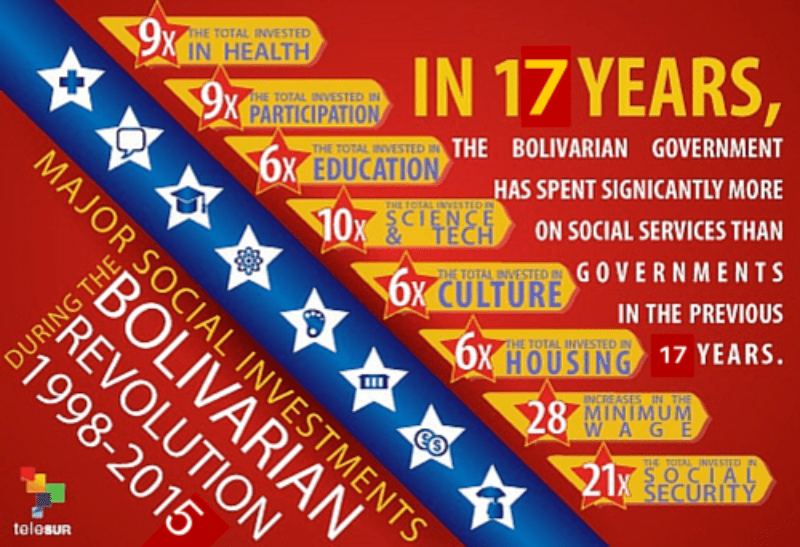
The social gains made under the Bolivarian Revolution in its
first 17
years continue today, despite the hardships imposed by U.S.
sanctions
and wrecking of the economy by the wealthy elites.
Nicolás Maduro authored the
following
op-ed
for
the Spanish newspaper El Pais while he was the
incumbent candidate in the May 20, 2018 presidential election for
the
Broad Front for the Homeland (Frente Amplio de la Patria).
Members
of the Broad Front included the Unified Socialist Party, the
Communist Party, the Homeland for All Party, Tupamaro Party, We
are Venezuela and several other political parties.
***
Our democracy is unlike any other. Because all other democracies -- in practically every country in the world -- were created by and for the elites. In these democracies, what's fair is what is convenient for a few. They are class-biased democracies, where the many are viewed as greater in number but lower in quality.
But not in Venezuela. In Venezuela, democracy is there for the many, and what's fair is what's good for all the people. And because people's needs are undergoing constant change and renewal, ours is a revolutionary project in a permanent state of change.
For instance, 20 years ago it was quite normal in Venezuela to be born in violent obstetric conditions. None of us ever considered that at the moment of birth, it is not just the newborn's health that is at risk, but also the health and the rights of the mother and her family. But the revolution changed and it became feminist. And everyone decided to remove sexist violence from our health system and to empower women through a national humanized childbirth program, respecting their personal project and decisions about how to give birth and rear their children.
 Twenty years ago, before
our
Bolivarian revolution, it was
normal to blame young people for their own unemployment, and it
was a widespread belief that poor people were poor because they
were lazy, and thus deserved to have poor health, miserable wages
and no roof over their heads. But things changed when we reached
government. We firmly asserted that it is not fair for people to
stay poor if they are working all day long. That is why, under
the Chavista administrations, we pursued full-employment
policies, and why my own government has launched -- through
the "Carnet de la patria" (homeland card) system that digitally
integrated all Venezuelan women and men -- the Chamba
Juvenil youth employment plan to guarantee that our young people
will have access to jobs and a future.
Twenty years ago, before
our
Bolivarian revolution, it was
normal to blame young people for their own unemployment, and it
was a widespread belief that poor people were poor because they
were lazy, and thus deserved to have poor health, miserable wages
and no roof over their heads. But things changed when we reached
government. We firmly asserted that it is not fair for people to
stay poor if they are working all day long. That is why, under
the Chavista administrations, we pursued full-employment
policies, and why my own government has launched -- through
the "Carnet de la patria" (homeland card) system that digitally
integrated all Venezuelan women and men -- the Chamba
Juvenil youth employment plan to guarantee that our young people
will have access to jobs and a future.
Twenty years ago, we also said that it was unfair for home ownership to be a pipe dream for the people and a reality just for the elites, and so we created the Gran Misión Vivienda housing plan, which has enabled us to build and deliver over two million quality homes to families free of charge, and with which we plan to reach five million completed homes in just a few more years.
Starting this year, additionally, I will implement a new Social Security plan so that Venezuela can once again have the kind of education and healthcare it used to have before the onslaught of economic warfare, and which had once made us a role model for all of Latin America. This Social Security will be built on an economy that is productive, stable, sovereign and prosperous, not one subjected to the ups and downs of oil prices.
The economic revolution in this new Bolivarian period needs to be innovative and creative. We have decided to respond to the inhuman commercial blockade that the governments of the United States and Europe are subjecting us to, and which has hurt our people so much, with the creation of the world's first ever cryptocurrency backed by reserves, the petro, whose benefits are already and immediately being invested in the people, as we have always done.
Because to us, it is an essential part of democracy that the economy should be at the service of the people and not the people at the service of the economy. An economy that is pure speculation, an economy that does not prioritize the prosperity and sovereignty of the people, means famine today and feast tomorrow (but feast only for the empire). The economy is at the heart of our revolutionary project. But in my heart, people come first of all. Either the economy is at the service of the people, or it is abuse. To us Bolivarians, economy means justice and democracy means protection.
In Venezuela we use a beautiful expression to describe our friends: "Mi pana" (my buddy). There are several explanations for it, but to me it is because in this country, a friend is like a part of yourself. And that is precisely what democratic coexistence is all about to us Bolivarians. Ours is a democracy of panas, because to us, the Homeland is our pana, and other people are part of ourselves. Because to us, there can only be freedom and democracy when there are others who think differently, and a space where they can express their identity and differences. That is why we have passionately worked towards transparency, respect, and respect from others for electoral laws with a view to the upcoming May 20 elections. We are competing with four other candidates, each one of them different, but all respectful of the democratic guarantees agreement subscribed by 14 of the 18 existing political parties in Venezuela. The process will be clean and exemplary, as much or more so than the dozens of elections in which Venezuelans have participated in the last two decades.
What's really going on is that we got tired of living in this polarized manner, and decided to turn the political violence of the guarimbas [anti-government barricades] into a constituent power, and find one another within a Constitution made by the people and for the people. That is why I can understand the despair of the elites, who spent decades turning the people into a repository of populism, insults, detestation and barbarity. Ours, on the other hand, is a democracy that is proud to be popular, no doubt about it. It is a democracy of the people.
It is a democracy that is also Latin American,
African
and Indigenous. Because here in Venezuela we have a rite and a
founding myth. We have Simón Bolívar and Hugo
Chávez, who are not in the past but who are already
history. And being history, they are also our present, because
they provide the meaning that guides our destiny. We are a unique
democracy because we are a democracy of panas: fair, Latin
American, popular and Bolivarian. In this democracy, the Other is
the Homeland and the Homeland is every one of us, here and now,
moving forward together.
Like Pablo Neruda wrote:
Creo que no nos juntaremos en la
altura
creo que bajo la
tierra nada nos espera
pero sobre la
tierra
vamos juntos
Nuestra unidad
está sobre la tierra
(I
believe we
shall not be reunited up in those heights
I believe nothing
awaits us underground
but here on earth we walk together
Our unity is here on earth)
(May 3, 2018. Translation by Susana Urra, El Pais.)
Photo Review
Actions Across the United States and Canada Oppose Interference in Venezuelan Internal Affairs

Militant demonstrations took place in Montreal, Ottawa, Toronto, Hamilton and Vancouver on February 4 to denounce the meeting in Ottawa of the Lima Group and to oppose all foreign interference, especially that of Canada, in the affairs of Venezuela. The actions made clear that Canadians do not support Canada's involvement in violating the sovereignty of other countries, be it through military or so-called diplomatic means, and that the Lima Group and its aim of regime change are fundamentally in violation of international law, and are not welcome in Canada.
Ottawa
Montreal
Toronto
Hamilton
Vancouver
Halifax Forum on Venezuela
A spirited meeting was held in Halifax on February 2 to denounce the attempted coup d'état in Venezuela. Speakers included Charles Spurr (No Harbour for War), Isaac Saney (Canadian Network on Cuba), Dr. Tim Bood (international election observer in Venezuela) and Afua Cooper (Halifax Poet Laureate and James Robinson Johnston Chair in Black Canadian Studies at Dalhousie University). A member of the Voice of Women for Peace read their open letter addressed to Prime Minister Justin Trudeau and Foreign Minister Chrystia Freeland. The interventions spoke to the legitimacy of the Bolivarian Revolution and of the Maduro government to represent the Venezuelan people.
United States
Emergency actions all across the United States took place on January 24-26, including in Washington, DC, Boston, Chicago, Los Angeles and San Francisco, as well as Seattle, Washington; Boise, Idaho; Salt Lake City, Utah; Minneapolis, Minnesota,; Springfield, Missouri; Indianapolis, Indiana; Dallas, Texas; Columbia, South Carolina; Miami, Pensacola, Sarasota and Tallahassee, Florida; and Pittsburgh and Philadelphia, Pennsylvania. Additional demonstrations took place worldwide and more are planned for the one-month anniversary February 23 and in March as well. The broad and vigorous opposition to U.S. sanctions, coups and potential military intervention are an important part of blocking the continuing U.S. efforts to dictate and dominate.
Washington, DC

New York City
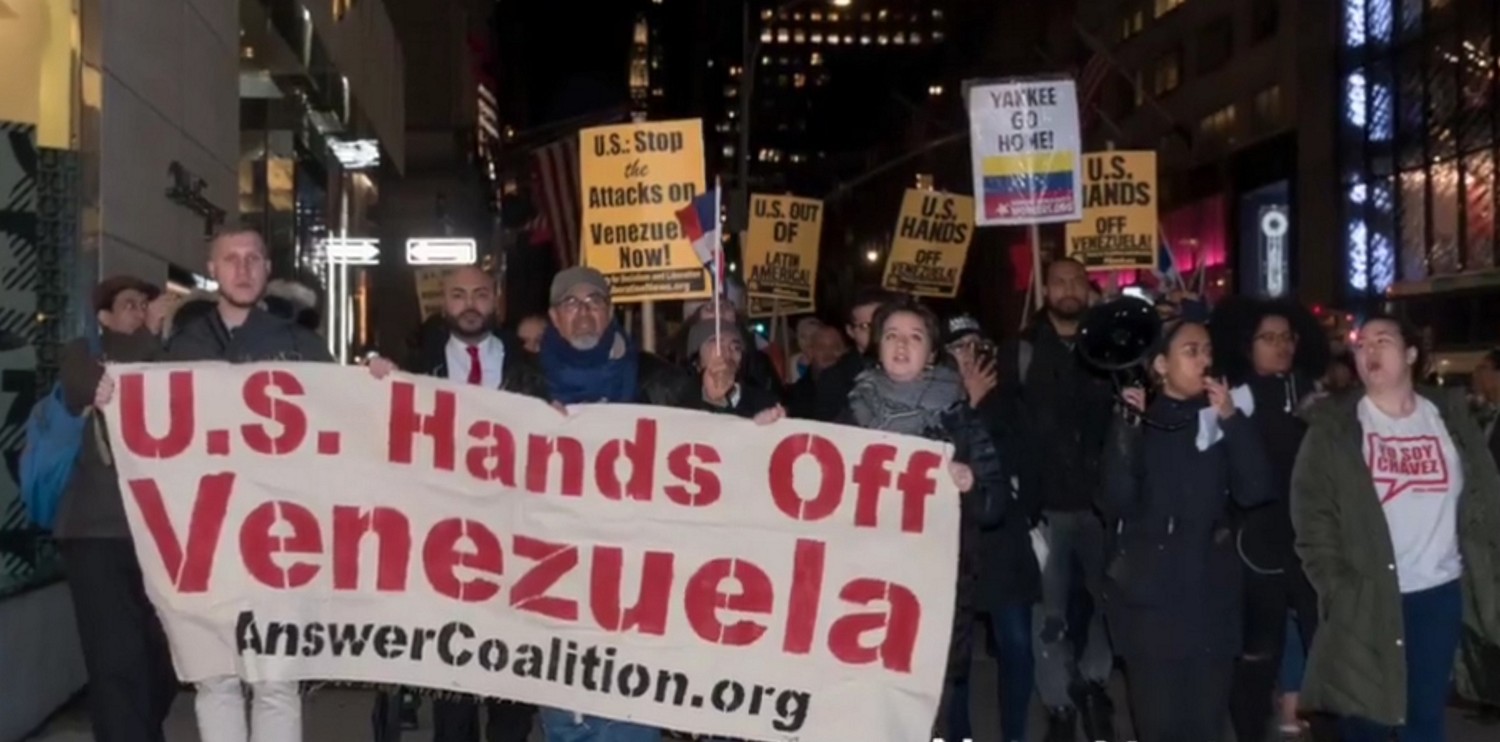
Chicago, Illinois
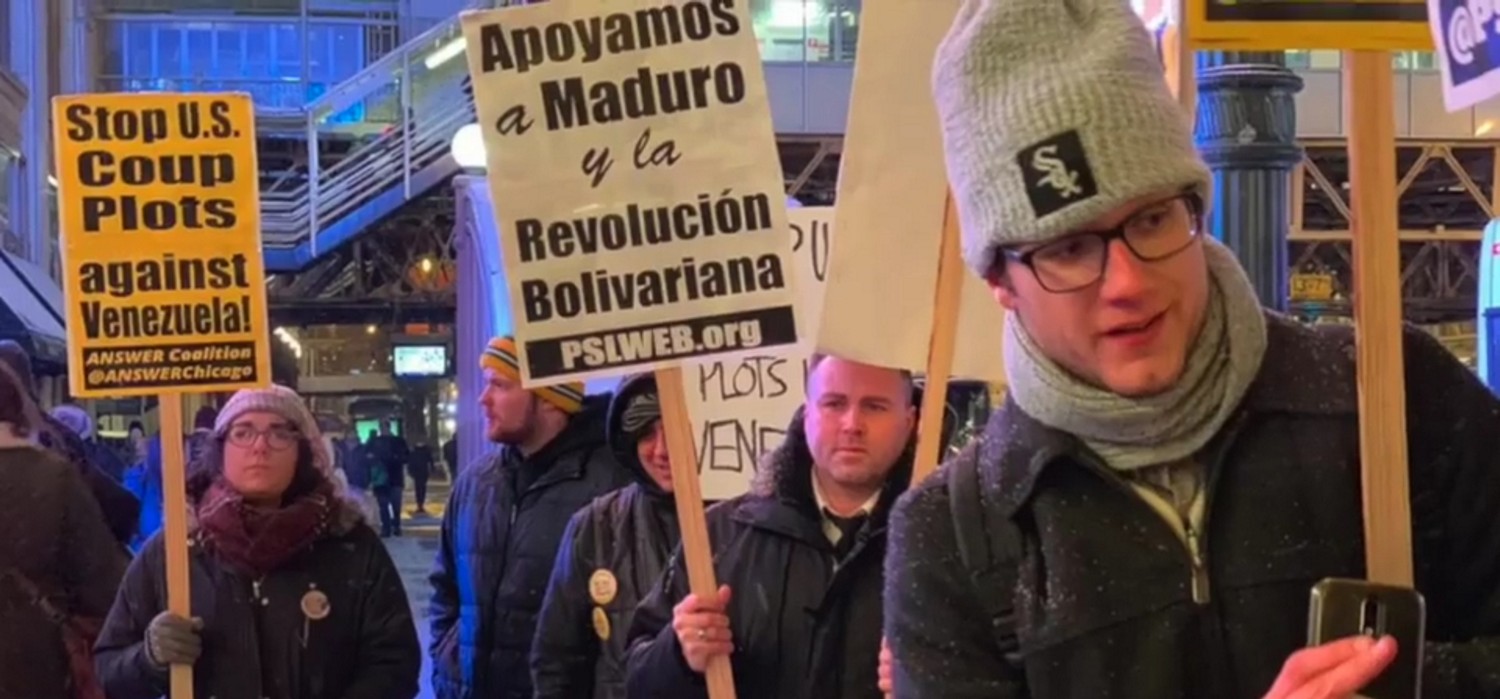
Miami, Florida
San Francisco, California
Los Angeles, California
(Photos: TML, Hamilton Coalition Against Sanctions and War, Frente Hugo Chávez, No Harbour for War, B. Patterson, ANSWER.)
Brazil
Working People March
Against Baseless
Lula Sentence
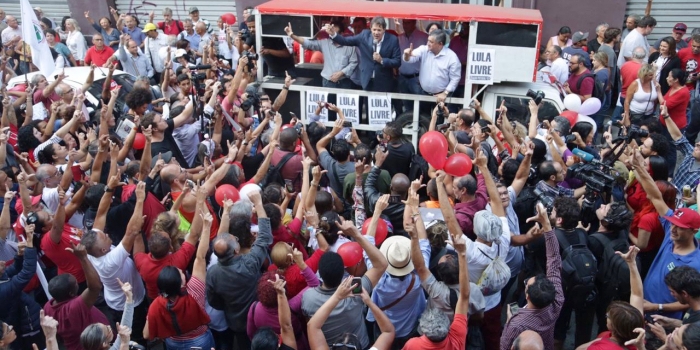
Professor Fernando Haddad addresses demonstration in support of
Lula,
São Paulo,
February 7, 2019.
The Brazilian Workers' Party (PT) organized
demonstrations -- on February 7 in São Paulo, Porto
Alegre,
Cuiabá, and in Recife on February 8 as well as in other
cities
across
the country -- in support of former President Luiz Inácio
Lula
da Silva, who was, without grounds, condemned by Judge Gabriela
Hardt
on February 6 to 12 years and 11 months in prison.
"Once again Lula is condemned with no evidence. The president, who did the most for the Brazilian people, is now a political prisoner," the PT affirmed in a manifesto published on social networks.
The PT also called for its members to concentrate in Curitiba, where Lula has been serving a jail sentence of 12 years and one month for another case, since April 2018.
Professor Fernando Haddad, who was Lula's replacement in the presidential race held in October 2018, highlighted that both the struggle for Lula's liberation and the workers' fight against the setbacks of democracy in Brazil are part of the same political process.
"We want fairness, we want justice. We want every
decision of
a judge to be based on evidence, not on conviction," Haddad said
outside the PT headquarters in São Paulo, and added, "I
speak
here, not as Lula's friend or as a PT member. I speak as a
citizen who is concerned with the destiny of our country and with
the lack of impartiality of justice."
According to the PT, the new sentence against the
former
president of Brazil is "full of errors" and represents "another
episode
of a judicial persecution plot which aims to dissolve Lula's
political
leadership."
Eugênio Aragão, a former Minister of Justice who cooperates with the PT leader's defence, stated that Lula's cases will not be resolved favourably through the judiciary because all lawsuits against him have been politically constructed.
"A favourable outcome for the Lula case will be
political, not
judicial. The accusation and the sentence against him are
political... they are part of a corporate project of the Public
Ministry and the Judicial Branch," Aragão explained,
confirming
that the new sentence lacks evidence, while stating that the real
goal is to keep Lula in prison.
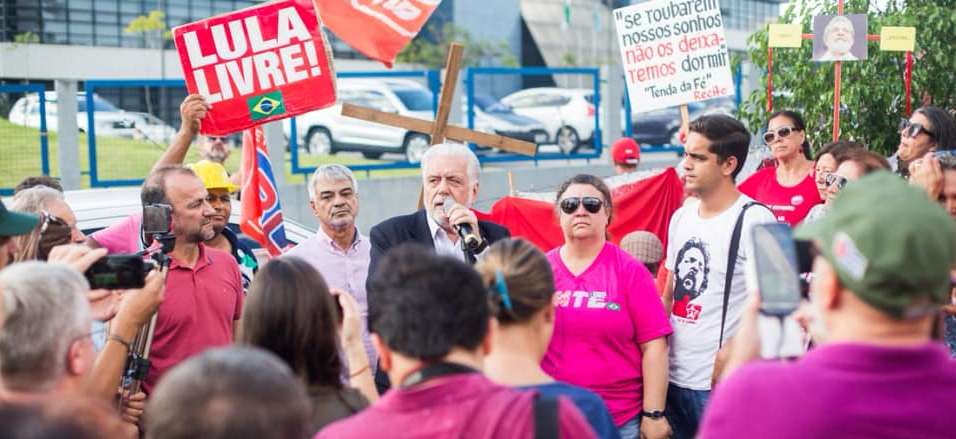
Curitiba, February 7, 2019
(teleSUR, February 8, 2019. Photos: CUT)
Justice for Lula Is a Fight of Positions and Principles
On behalf of the Communist Party of Brazil (PCdoB), National Vice-President Walter Sorrentino sent a message in support of former President Luiz Inácio Lula da Silva, who was the victim of new injustice on Wednesday, February 6. Lula has been sentenced to another 12 years and 11 months in prison in another baseless trial and with a sentence as controversial as the one which imprisoned him six months before the presidential elections of 2018.
***
Dear and esteemed comrades of the Free Lula Committee,
Today is another day of struggle and protest for justice against the sentencing of Lula.
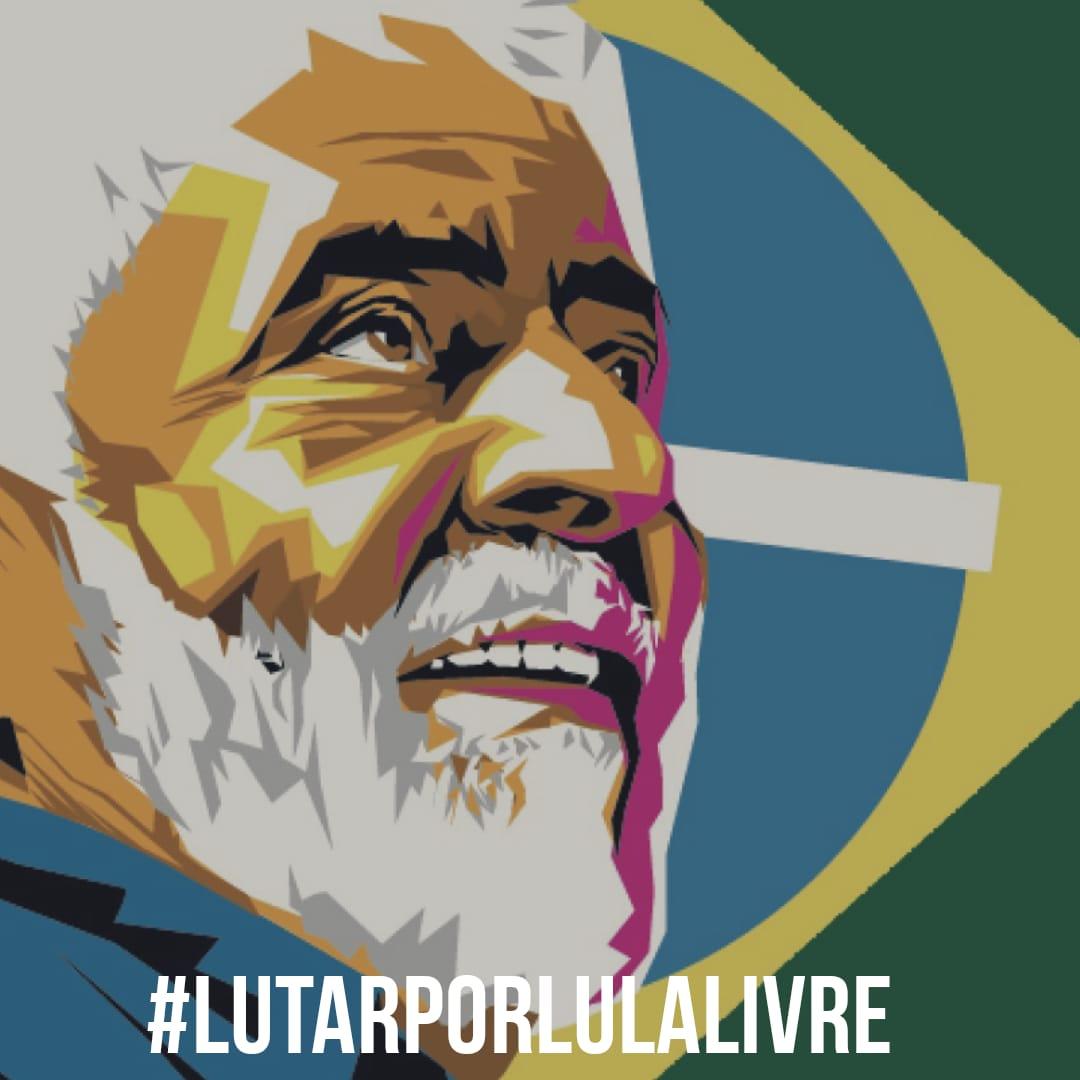 The new sentence is
the
continuation of the struggle of the
enemies of the people and the nation to try to eradicate the
political and social forces that have given rise to great
achievements for Brazilians throughout Brazilian history. It is
the unparalleled cruelty of the dominant sectors that have never
hesitated to trample on the Constitution and the democratic rule
of law when it comes to strangling popular leaderships. It is a
pure expression of political racism.
The new sentence is
the
continuation of the struggle of the
enemies of the people and the nation to try to eradicate the
political and social forces that have given rise to great
achievements for Brazilians throughout Brazilian history. It is
the unparalleled cruelty of the dominant sectors that have never
hesitated to trample on the Constitution and the democratic rule
of law when it comes to strangling popular leaderships. It is a
pure expression of political racism.
We know who are the ones who promote it, we know what they represent; we have faced them many times throughout the 20th century, they do not frighten us. We will have to do it one more time and overcome them, in the name of justice and freedom.
Lula will become even larger in the history of Brazilian struggles. His sentence represents an entire historical situation that Brazil and the world are experiencing. The struggle for his freedom synthesizes the battle against new forms of authoritarian domination that have arisen, supported by a sweeping lawfare that is attacking the democratic rule of law.
Therefore, obtaining justice for Lula is not a momentary fight or a short-term movement, but about positions and principles that represent a historical commitment to fight against the executioners of the people. Lula's high morale feeds our struggle, and our struggle sustains the resistance of Lula and vast sectors of the Brazilian people against arbitrariness.
Warm greetings to you all. Our readiness and strong solidarity with the national leadership and the members of the PT and the national and international Free Lula Committee,
Walter
Sorrentino
National
Vice-President, PCdoB
(Feburary 6, 2019)
Six Holes in the New
Lawfare Conviction
Against Lula
On February 6, interim judge Gabriela Schmidt, who recently replaced Sergio Moro in the Operation Car Wash investigation, convicted Luiz Inácio Lula da Silva on corruption charges related to alleged illegal renovations on a vacation property in Atibaia, a small town in the São Paulo countryside. She sentenced him to 12 years and 11 months. This is the second of three corruption cases that were initiated by right-wing extremist President Jair Bolsonaro's new Justice Minister Sergio Moro, who is now jumping through hoops to protect his boss' son Flavio from concrete allegations of money laundering and associating with a paramilitary deathsquad which is being investigated for the assassination of city councilwoman Marielle Franco. Like the previous conviction which removed Lula from the presidential elections, this case has more holes than the proverbial Swiss cheese. Here are a few examples:
1) As in the case of the Guaruja beachfront apartment used to arrest Lula at the outset of the 2018 election season when he was leading in the polls, investigators were unable to prove that Lula owns the property in question. In this case, the property is legally registered in the name of Fernando Bittar. Bittar is a businessman and son of one of Lula's oldest friends, Jaco Bittar, who is a former union leader and ex-Mayor of Campinas, which has a population of 1 million and is the 11th richest city in Brazil in terms of GDP. The Bittar and Da Silva families have been spending holidays together since the 1970s. The investigative team made the argument that the Bittar family were used as patsies, but they were unable to prove that and the value of the relatively modest property in question is clearly affordable by Fernando Bittar.
2) As in the case of the Guaruja apartment renovations, it is unclear, in legal terms, why a local court in Curitiba has jurisdiction in the neighbouring state of São Paulo, which has its own district courts and public prosecutors. This fact alone, which violates article 70 of the Brazilian Criminal Code, would be sufficient grounds for an impartial judge to throw out the entire case. However, in 2018, Federal Attorney General Rachel Dodge, who has been accused by the Federal Police of protecting ex-President Michel Temer, rejected a request by Lula's defence team to relocate the case to its proper area of jurisdication in the São Paulo court system in an act of clear political partisanship.
3) Lula's corruption conviction refers to an abuse of authority in exchange for services. As in the previous Car Wash case against Lula, investigator Sergio Moro was unable to prove what these favours were, since the renovations in both cases took place several years after Lula left the presidency and no longer held any public office.
4) According to a perverse loophole in Brazilian law which dates back to the Inquisition, a Judge can sometimes create his own investigation and rule on it with no jury. Judge Sergio Moro spent years investigating Lula. His whole career depended on a conviction, so when it went to trial he discarded all evidence from the defence and declared his own investigation victorious. Although he was allowed to rule on his own case, the Supreme Court has thrown out similar cases in the past, due to questions of impartiality.
After years of being presented in the northern media as an impartial anti-corruption hero, Moro's mask fell and he revealed himself to be a right-wing partisan political actor when he joined Bolsonaro's neo-fascist government as Justice Minister and started announcing measures to attack labour unions and facilitate extra-judicial killings by police officers. When Moro stepped down from Operation Car Wash to enter Bolsonaro's cabinet, he turned it over to local protegé, Gabriela Schmidt. She followed the lead of her mentor and, with a stroke of the pen, threw out all 1,643 pages of the defence team‘s evidence of Lula's innocence.
5) Like his previous conviction, this conviction is based entirely on one plea bargain testimony made by a corrupt businessman who received partial asset retention and sentence reduction in exchange for his testimony.
6) Operation Car Wash is a collaborative investigation that was set up through a partnership between the U.S. Department of Justice (DOJ), a Federal District Court and public prosecutor's office in Curitiba, Paraná. The excuse for DOJ engagement in the operation was the Foreign Corrupt Practices Act, which does not apply in the convictions of Lula as they were unable to prove he had U.S. bank accounts or engaged in bribes using dollars. Nevertheless, on four occasions, U.S. DOJ officials have publicly bragged about the Lula conviction.
If Lula were not currently in jail, due to an exception made by the Supreme Court that enabled his arrest before his appeals process played out and General Vilas Boas' public threats to the ministers, at the outset of an election season in which Lula was leading all polls with double the popularity of Bolsonaro, he would be able to wait for his appeals process in freedom. Appeals processes usually take years, and it will probably be a long time before this appeal is ruled on. Meanwhile, Lula continues to rot away in solitary confinement in violation of the Mandela Rules, due to a U.S.-backed Lawfare conviction that, as Glen Greenwald pointed out last year, was clearly made to remove him from the elections. This removal opened the path for the establishment of a client fascist state that is backing U.S. interventions in Venezuela, handing over natural resources to northern capital and butchering labour and human rights. Together with its international capitalist overlords, it is now trying to destroy the legacy of the most popular President in Brazilian history.
(Brasil Wire, February 7,
2019.)
El Salvador Presidential Election Results
The Need to Draw Warranted Conclusions
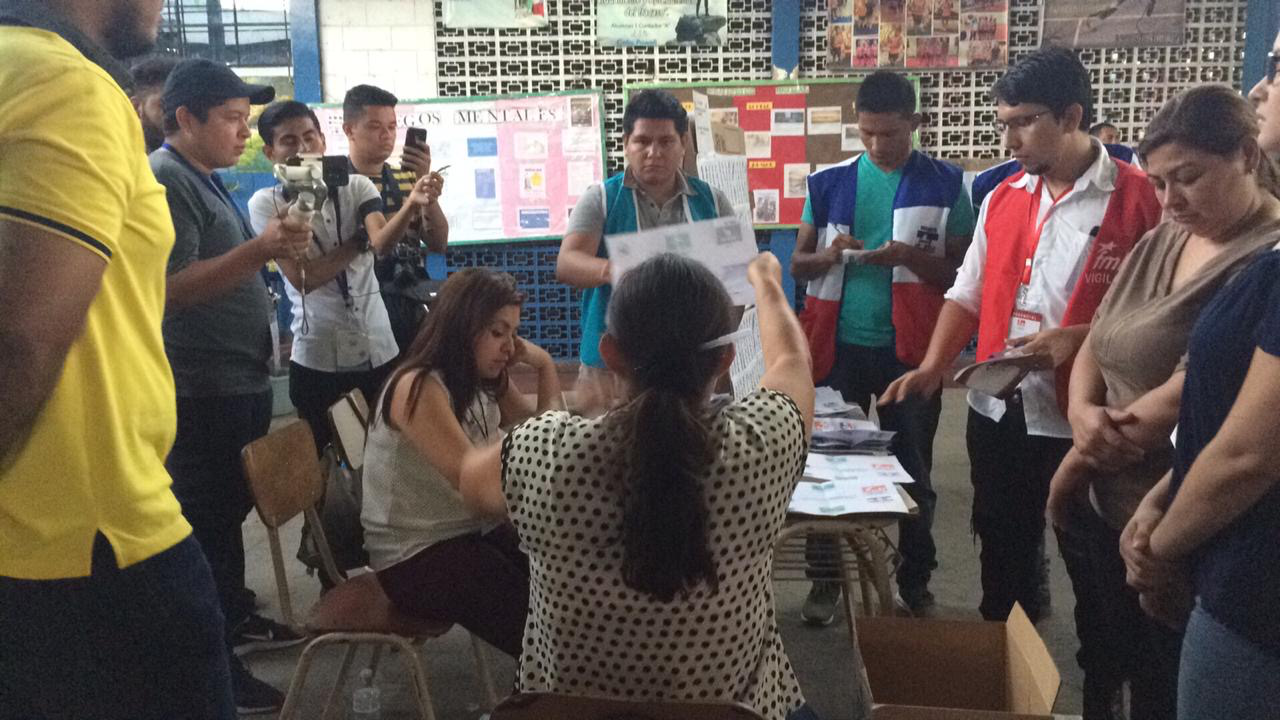
Voting underway in San Vicente outside San Salvador, February 3,
2019.
The people of El Salvador feel the urgent need to draw warranted conclusions from the results of the presidential election held on February 3. The election was won in the first round by Nayib Bukele, an independent promoting a platform called "new ideas." During the election, he associated himself with the Grand Alliance for National Unity (GANA), reportedly at the last minute after being unable to register his own New Ideas party in time to have his name on the ballot as its candidate.
This is the sixth presidential election since the end of the country's 1980-1992 dirty war instigated by the U.S. imperialists to consolidate their stranglehold over the resources and labour of the country. Taking into account the low voter turnout of 51.8 per cent and the categorical rejection of the Farabundo Martí National Liberation Front (FMLN) which ostensibly opposes neo-liberalism and protects the people against its nefarious consequences, it is important to draw warranted conclusions from the election results. Was Bukele elected because he has "new ideas"? Or is he the creature of the kind of marketing agencies which have come forward all over the world to make sure the striving of the people for empowerment is smashed in favour of so-called independents who have no affiliation to a political organization to which they are accountable? Where does El Salvador go from here?
Bukele, at 37 years of age, is now the youngest president in Latin America. Not much is said about what his "new ideas" might be and why they are favourable to the Salvadoran polity. Nonetheless, the support he has received from the U.S. imperialists and allied governments such as Canada since he won tell a definite story. The first person to congratulate him on his victory was the self-declared president of Venezuela, Juan Guaidó for whom Bukele had nothing but praise.
Meanwhile, a lot is written about the causes for the humiliating defeat of the FMLN. Stories include two failed presidencies, one marked by corruption and another by inefficacy, as well as unsavoury self-serving alliances with the party of the Salvadorean oligarchy ARENA. The main feature of all these stories is to hide the difficult conditions in El Salvador which is a small country under tremendous pressure as a result of U.S. imperialist plunder of its resources, exploitation of its people as a source of cheap labour and support for the oligarchy and its thievery and human rights abuses. What should be the program and role of a political party has become the most important but forgotten question. Reducing the discussion to mere electoral politics and competition do not permit the real matters of concern to be explored and discussed. The international media's euphoria over Bukele's election has no room for a discussion on how he will tackle the problems the people of El Salvador face.
Thus far, the FMLN has not addressed the requirements of the Salvadorean polity at this time. Its statement conceding defeat on February 3 takes full responsibility and states that it would fulfill its role as the opposition in the National Legislature to favour everything that benefits the people such as by defending social programs and citizen security and by opposing whatever affects the population negatively. It cited "privatizations and the sacking of workers, among other things." This is a reactive agenda at a time the people need their own independent politics and agenda.
Two days later, the FMLN issued a communiqué in which it said it was aware of the necessity to carry out "a detailed examination of the new political and social realities, of its methods and strategy, and the need to make changes in its leadership structures so as to continue being a party of the left capable of fighting along with our people for a society with social justice, equality and freedom." It said it would do this by such things as incorporating more women and youth into the party and moving its internal elections up to early this year. The communiqué issued by the Political Commission called on all the members of the Political Commission by name to not stand for any leading positions in the party in those elections.
ARENA's National Executive Council also fell on
its
sword, announcing on February 5 that it was requesting the
party’s
national electoral council move up its internal elections to the
earliest possible date, saying that none of its current members
would
seek re-election, but would hand their duties over to whomever
the
party's membership elected.
As for Bukele, he is said to be a former member of the FMLN who was expelled in 2017 on what were called ethical grounds. Before being elected he is reported to have indicated that if he became president he would govern independently of GANA with whom he is said to have struck some kind of a deal. Media reports indicate that terms of the arrangement which led to GANA agreeing to Bukele appearing on the ballot as their candidate have not been revealed. However, a little over a week before polling day he made a point of denouncing "dictators of the right and the left," singling out Nicolás Maduro in Venezuela, Daniel Ortega in Nicaragua and Juan Orlando Hernández in Honduras, whom he said would "never have legitimacy because they keep themselves in power through force and do not respect the will of their peoples." How he intends to gauge the will of the people, let alone represent them without a political party which links the people to the political power is a question which requires an answer. The other president which promised such things, Emmanuel Macron in France, also said to be the youngest president in that country's history, has not fared very well as concerns establishing democratic credentials or sorting out the crisis in which France is mired.
Bukele's campaign was based on his claim to be an anti-establishment candidate and alternative to both ARENA and the FMLN, which are the only two parties to hold the presidency since the end of the 1980-1992 civil war. During the war the U.S. intervened militarily against the people's forces led by the FMLN and other insurgent forces fighting for national liberation against the country's mafia ruling elite and their U.S.-trained death squads. ARENA was founded in 1981 by a military figure known as a deathsquad commander. The FMLN, which became a political party after the signing of peace accords that ended the war, has occupied the presidency since 2009, but without holding a governing majority in the legislature. ARENA held the presidency for 20 years before that, ruling with impunity. GANA itself was formed in 2010 out of a split within ARENA.
Bukele's campaign is reported to have relied heavily on social media as opposed to engaging with electors directly around the country or taking part in public debates. This has become the familiar pattern of marketing oligopolies engaged in the business of furnishing election campaigns. They replace the organizing and politicizing role of political parties, which no longer exists, with social media campaigns. They engineer thousands of "likes" and declare these represent "the will of the people." It is a fraud.
A central plank in the platform of the 37 year-old businessman and former mayor of San Salvador was a promise to fight corruption. He has said he intends to set up an international anti-corruption agency similar to the one in Guatemala, which to this day continues to be one of the most corrupt governments on the planet.
One challenge the new president will face in getting legislation approved in the Legislative Assembly is that 43 votes are needed to pass a law. GANA holds just 10 of the 84 seats in the legislature, to ARENA's 37 seats and the FMLN's 23, with two more years until new elections take place to that body. What wheeling, dealing and horse trading will take place promises more corruption along with the obvious fact that this president's government does not in fact have the consent of the governed. Any alliance will be difficult and executive rule will solicit great opposition.
Within this situation, there is an urgent need for Canadians to support the people of El Salvador, including their compatriots resident in Canada, as they face the challenges which lie ahead. The U.S. imperialists and the government of Canada along with them are hell-bent on eradicating any program which upholds the sovereign right of the peoples to set their own agenda and governments which put their interests in first place, not those of the U.S. and its war machine.
TML Weekly calls on the working people of this country to oppose the facile conclusions drawn on what these election results show. It is up to the people of El Salvador themselves to deliberate on this matter and see how they are going to go forward. It will not help them to divert attention from fundamental democratic principles. This includes opposing any attempts to interfere with the right of the Salvadorean people to take independent stands and set an agenda that allows them to defend what belongs to them by right.
Electoral setbacks can be overcome. The contradictions between those who have usurped power by force and fraud and the people striving for empowerment are getting sharper. As they tackle the problems they face, the people are bound to find solutions which favour them.
The people of El Salvador have a wealth of experience fighting for social justice and their own rule. They were engaged in that fight before the dirty war launched by the U.S. against them, during the dirty war and since the dirty war. The current problems related to the economy, the high levels of insecurity and social crime, the pressure to migrate north in spite of the risks, and the continuing pressure from U.S. imperialism through the many economic and military entanglements that exist require practical measures, not oaths of loyalty to a cause or recriminations. Most importantly, they reveal the need to create political organizations through which the people can participate in taking the decisions which affect their lives, defend their decisions and realize their striving for empowerment. We are confident that the revolutionary mettle of the people is such that they will make sure their many years of struggle and sacrifice will yield the results they want.
The Election Results
Results of the Presidential election held in El Salvador on February 3 indicate that Nayib Bukele won the presidency with 53.10 per cent of the valid votes. Due to a low voter turnout of only 51.8 per cent of the country's 5.2 million eligible voters, this is not the resounding endorsement the media are speaking about.
Bukele was followed by Carlos Calleja, presidential candidate for a coalition of four parties, Alliance for a New Country led by the Nationalist Republican Alliance (ARENA) with 31.72 per cent of the votes cast, Hugo Martinez for the Farabundo Martí National Liberation Front (FMLN) with 14.42 per cent and Josue Alvarado of Vamos with 0.78 per cent. Bukele won in all 14 departments of the country and will start his five-year term on June 1.
In announcing the preliminary results the president of the Supreme Electoral Tribunal (TSE), Julio Olivo said previous elections had on average a participation rate of around 61 per cent. Factoring in the turnout shows Bukele having been elected by only 26 per cent of eligible electors. One of the magistrates of the TSE was quoted as calling on political actors to take a reading of what a significant section of the population was saying to them with their non-participation in the election.
International observers generally reported that election day went smoothly, with Salvadorans able to vote freely and easily. However the Committee in Solidarity with the People of El Salvador (CISPES), which says it has observed every election in El Salvador since the signing of the 1992 peace accords, said they found it "concerning" that, during this campaign, Bukele sent "very strong messages to the public warning of a supposed electoral fraud," and called it "highly irresponsible to have sown the seeds of doubt in the population without any evidence." They added that Bukele himself took to social media on the day before and the day of the election calling for votes, and said it was a flagrant violation of El Salvador's prohibition on campaigning in the lead up to election day.
Besides receiving the congratulations of Juan Guaidó, the self-proclaimed "president in charge" of Venezuela, among the first to congratulate Bukele on the night of his victory were the U.S. ambassadors in El Salvador and Guatemala as well as Secretary of State for the Western Hemisphere Kimberly Beier, Trump's National Security Advisor John Bolton and Luis Almagro, the Secretary General of the Organization of American States who has made a habit of presenting his own reactionary opinions as those of the organization despite these opinions having been turned down repeatedly by a majority of member states.
In its communiqué the State Department wrote: "The United States and El Salvador share a strong partnership based on our joint efforts to improve security and our mutual commitment to the rule of law and inclusive economic development." It went on to say that it valued the two countries' cooperation and looked forward to "working with President-elect Bukele to expand economic opportunity, strengthen democratic institutions, and redouble efforts to make El Salvador safer and more prosperous for all Salvadorans." It is precisely the U.S. that has been and continues to be a prime contributor to all the ills it claims to be interested in addressing in the country. This problem will present the people of El Salvador with their greatest challenge for which they will require a political party to effectively represent their collective will.
(El Salvador.com, EFE-EPA)
Guatemala
Government to Pass Law Forgiving War Crimes
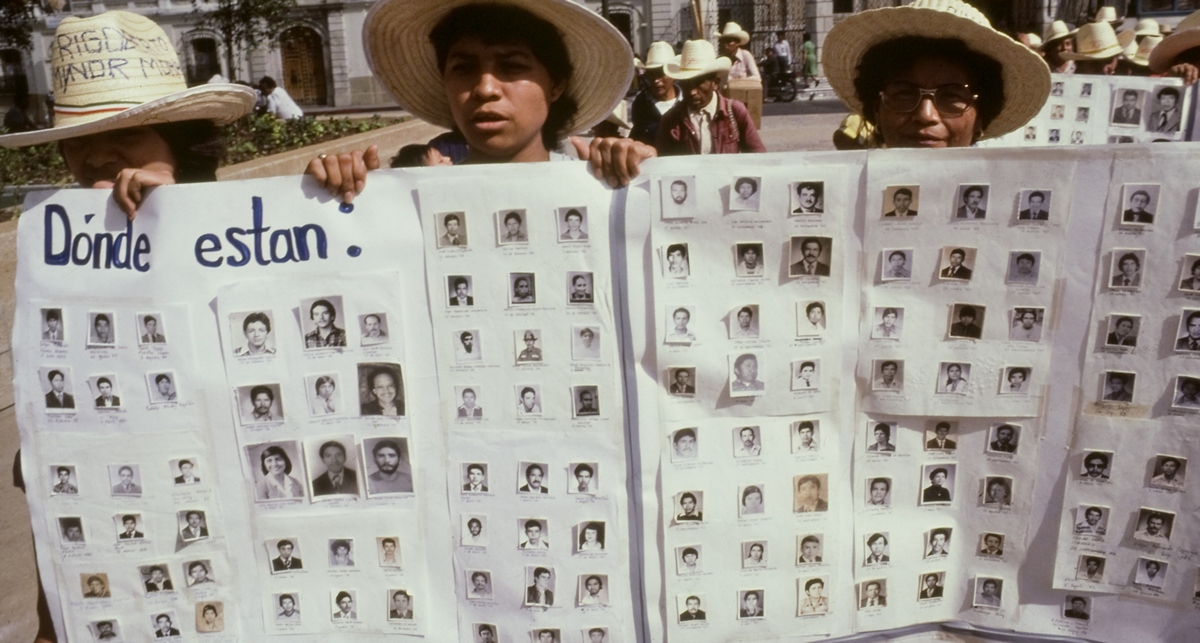
March for the disappeared.
Guatemala's Congress is considering a bill to reform the National Reconciliation Law of 1996 to give absolute impunity for crimes that took place during the 1960 to 1996 Guatemalan Civil War. At least 33 military officers and militia members have been convicted of war crimes since 2008. If the reform is approved, all those convicted and anyone held on remand awaiting trial would be freed within 24 hours. Any trials or investigations would be cancelled.
The U.S.-based North American Congress on Latin America informs, "This legislation would violate international law, which establishes that grave violations of human rights must not be subject to amnesties, statutes of limitation, or other mechanisms that would hold perpetrators in impunity." As of January 31, the bill is in first reading. Amendments can be introduced at third reading and then a final vote is taken. If approved by a simple majority, it goes to the Executive for approval and promulgation.
|
|
The proposed amnesty is part of a concerted effort by President Jimmy Morales and other ruling elites to give themselves impunity for crimes committed during the civil war and corruption in the present. This includes blocking the work of the UN-backed International Commission Against Impunity in Guatemala (CICIG) and undermining the Constitutional Court, which has ruled in favour of CICIG being able to carry out its work in the face of government interference.
The Guatemalan Civil War was the result of the 1954 U.S.-backed coup against the democratically elected President Jacobo Árbenz, following which a series of military dictatorships came to power. These dictatorships received assistance from U.S. to wage war against guerrillas and brutally suppress other progressive forces. The crimes against the people included genocide, extrajudicial killings, torture and sexual slavery, in which 200,000 people were killed or disappeared, including 5,000 children. Ninety-three per cent of human rights abuses were committed by U.S.-backed government forces, compared with three per cent by guerrilla groups, according to the post-war Commission for Historical Clarification.
Convicted war criminals include former head of the armed forces Benedicto Lucas García and former intelligence chief Manuel Callejas y Callejas, who are serving 58 years for crimes against humanity, the 1981 forced disappearance of 14-year-old Marco Antonio Molina Theissen and aggravated sexual assault against his older sister Emma Guadalupe. García is also one of eight senior military officers accused of crimes against humanity at the Creompaz military base where 550 bodies were exhumed from mass graves. Other criminals include two military officers convicted in 2016 for sexually enslaving 15 Mayan Q'eqchi' women in Sepur Zarco village after their husbands were disappeared. Former military commissioner Heriberto Valdez Asij was jailed for 240 years for crimes against humanity and the forced disappearance of seven of the women's husbands. Lieutenant Colonel Esteelmer Reyes Girón was sentenced to 120 years in jail for crimes against humanity and the murder of 20-year-old Dominga Cuc Coc and her two daughters.
The possibility that all of these criminals would be set free should amnesty be enacted has been decried by survivors and the victims' families. "The total amnesty violates our right, and that of the Guatemalan people, to justice and the truth. It would thwart the hopes of victims to have a little peace in our souls," Lucrecia Molina Theissen, the eldest sibling of Marco Antonio Molina Theissen, told the Guardian. Michelle Bachelet, the UN Human Rights Commissioner, condemned the move as a "drastic step backwards for the rule of law and victims' rights."
The revanchist spirit against the Guatemalan
people of
the
proposed reform is exacerbated by the bill's provision to enable
legal action against human rights activists considered a threat
to public law and order, which activists consider could lead to
reprisals against those who testified in high-profile war crimes
cases. UN Human Rights Commissioner Bachelet said she is "deeply
worried that if this amendment is approved, it may lead to
retaliation against all those courageous victims, witnesses,
judges, public prosecutors, lawyers and organizations who have
been promoting justice for past crimes in Guatemala."
(With files from UN News Centre, AFP, NACLA, Guardian, thehill.com.)
Cuba
Upcoming Referendum Exemplifies Citizen Participation in the New Constitution
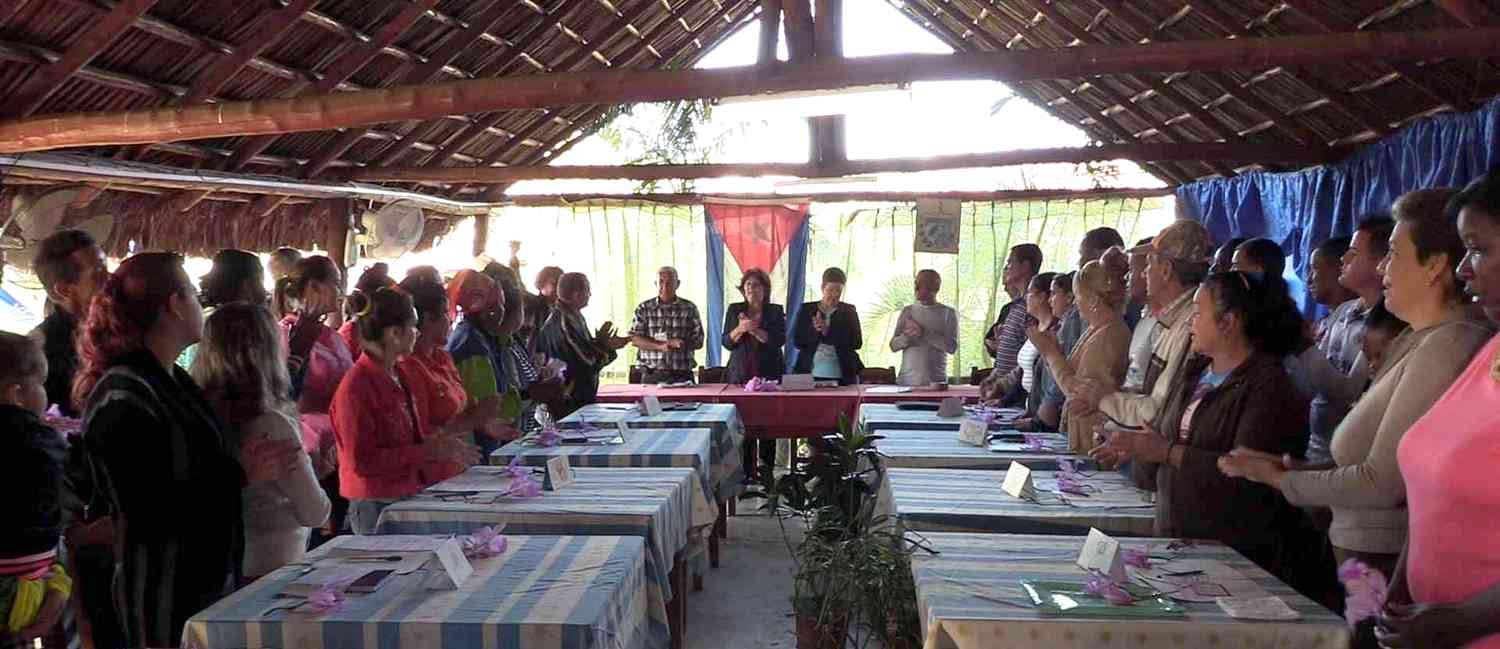
Residents of Pinar del Rio establish their electoral commission,
January 14, 2019.
One of the most important steps leading to the February 24 referendum on Cuba's new Constitution took place recently with the establishment of electoral commissions at the provincial, municipal, and constituency level, and for special voting sites.
In solemn ceremonies, those designated as members of these bodies signed the document establishing their creation, an oath, and code of ethics, reflecting the responsibility they have assumed to organize, direct, and validate the vote, in which some 8 million Cuban citizens are eligible to participate.
This final process is required before the new Constitution, already approved in a roll call vote by the 583 deputies present during the National Assembly of People's Power Ninth Legislature's Second Period of Ordinary Sessions last December 22, can become effective.
The establishment of these electoral commissions, which began January 4, was preceded by the swearing-in of 17 members of the National Electoral Commission (CEN) in charge of the referendum as dictated by the National Assembly convocation, in accordance with Law No. 72, the Electoral Law.
At the same time, across the country, progress is being made on the organization and training of those who will work at the polls, and the creation of conditions to guarantee all required materials and logistics.
CEN President Alina Balseiro Gutiérrez noted that work is also underway on the communications plan, the printing of ballots, ballot boxes, and voter registries.
The Referendum's Legal Basis
Law No. 72, the Electoral Law approved by the National Assembly October 29, 1992, is the legal document that governs the Cuban Electoral System and its work.
This law's Chapter Three establishes, among other things, that Electoral Commissions from the national level to the provincial, municipal, district, constituency, and special, are created to organize, direct, and validate elections and referendums, the latter being the subject of an entire section: No. 10.
What Is a Popular Referendum?
Article 162 of the aforementioned law stipulates, "By way of a referendum called by the National Assembly of People's Power, citizens have the electoral right to state if they approve proposed Constitutional reform laws, or not," before these may enter into effect.
Ballots are to convey the issue being addressed
in a
clear, concrete fashion. In the case of the upcoming February 24
referendum, the question will be: "Do you approve the new
Constitution
of the Republic?" followed by two spaces labelled "Yes" and "No,"
as
established by law.
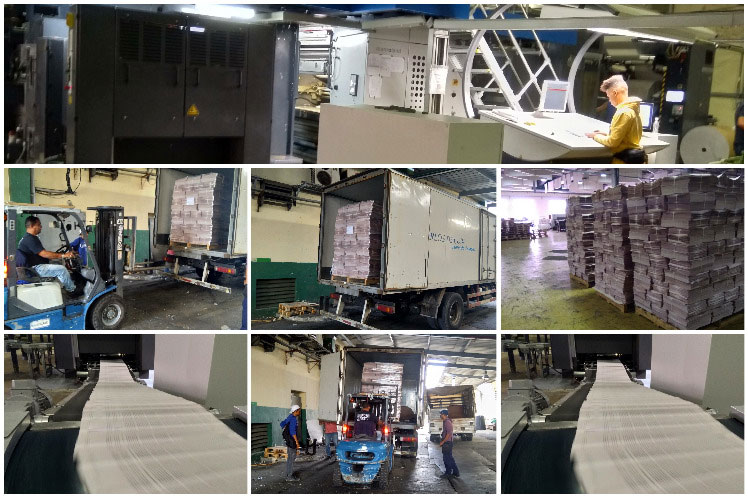
Cuba has printed 3.1 million copies of the draft constitution
being
voted on in the
February 24, 2019 referendum.
The Procedure
- The National Assembly of People's Power makes available to the population the Constitution to be submitted to a popular referendum, and sets the date for the vote.
- The Council of State names members of the CEN.
- Provincial, municipal, district, constituency, and special electoral commissions are created.
- The CEN, in coordination with the Foreign Ministry, makes arrangements to guarantee the right to vote of those who are outside the country on the day the referendum is held.
- Municipal Electoral Commissions compute votes cast in the municipality and forward results to Provincial Electoral Commissions.
- Provincial Electoral Commissions compute votes cast in all municipalities of the province and send results to the CEN, which performs the national calculation.
- Electoral Commissions outside the country, once the count is complete, communicate results to their respective embassies, which remit these to the Ministry of Foreign Affairs, which communicates this information to the CEN.
- Once the referendum's final vote count has been calculated, the CEN informs the Council of State, which publishes the results and communicates the decision to the National Assembly for all pertinent purposes.
The People's Constitution
The approval of the new Constitution was preceded by a three-month process of consultation with the people, in what has been described as a genuine expression of the democratic and participatory nature of Cuba's socialist system. The text was enriched with opinions expressed during 133,681 meetings held in neighbourhoods, workplaces, secondary schools, and universities. These proposals were all evaluated and led to changes in almost 60 per cent of the proposed articles, including those regarding the country's political and economic foundations; rights and responsibilities; and the structure of the State, among other important issues.
For Your Information
- Following the triumph of the Cuban Revolution, transformations were initiated directed toward achieving transparency in electoral processes, which would become increasingly participatory.
- In 1976, through a national referendum, the new Constitution of the Republic and the Constitutional Transition Law were approved.
- In October 1992, the National Assembly unanimously approved a new Electoral Law, which, for the first time, established direct, secret ballot votes in provincial and national elections.
- Members of the CEN are drawn from state bodies and agencies, including the armed forces.
- Their responsibility is to develop norms to guide the organization, direction and validation of the referendum process and to ensure compliance, demanding and assuring impartiality and transparency in all election-related actions.
- According to the current Constitution, all Cubans over 16 years of age are entitled to vote, except those mentally incapacitated by court order, and those who are legally excluded due to a criminal conviction. Voter registration is automatic and free of charge, upon reaching the stipulated age.
Members of the National Electoral Commission
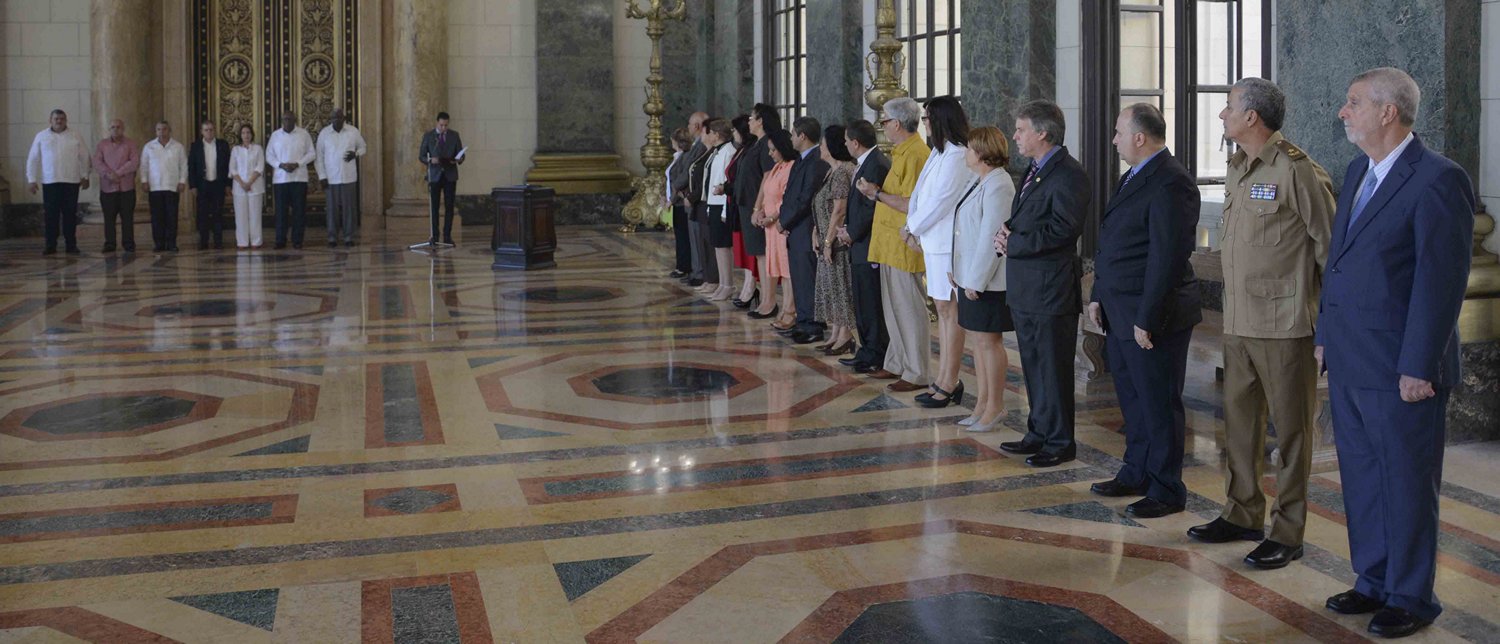
The 17 members of the National Electoral Commission are sworn in,
December 28, 2018.
- Alina Balseiro Gutiérrez, president
- Tomás Amarán Díaz, vice president
- María Esther Bacallao Martínez, secretary
Representatives:
- Marina Capó Ribalta, Ministry of the Interior
- Caridad Álvarez Rivero, National Assembly of People's
Power
- Lidia Montes de Oca Fernández, National Organization of
Legal
Aid Collectives
- Manuel Félix Roig, National Organization of Legal Aid
Collectives
- Cecilia Valdés Milián, Ministry of
Communications
- Luisa Márquez Echevarría, Cuban Radio and
Television
Institute
- Joselyn Sánchez Hidalgo, People's Supreme Court
- Yanio Hernández Heredia, University of Computer
Sciences
- Minerva Valdés Temprana, Council of State
- Eralia Rodríguez Rodríguez, Attorney General's
Office
- Eugenio González Pérez, Ministry of Education
- Marcelo Pérez Pérez, Ministry of the
Revolutionary
Armed Forces
- Marcos Rodríguez Costa, Ministry of Foreign Affairs
- José Alexis Ginarte Gato, National Union of Cuban
Jurists
(Granma, January 31, 2019. Photos: CubaTV, Trabajadores, Cubadebate.)
Website: www.cpcml.ca Email: editor@cpcml.ca

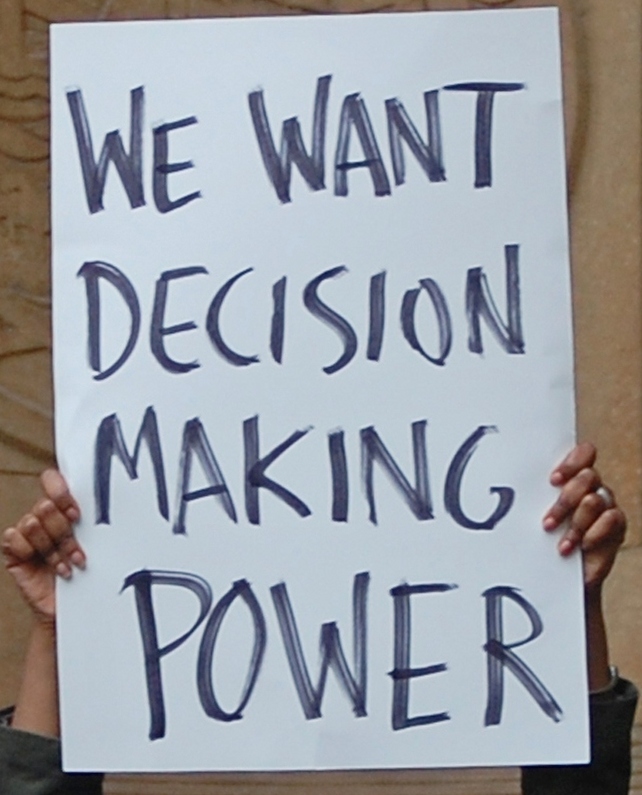 "For the first time
ever,
our security agencies will
provide direct security briefings to key members of national
political campaigns," Minister of Public Safety and Emergency
Preparedness Ralph Goodale told reporters on January 30, when the
Liberal government announced its Election Incident Public
Protocol. On the same day, in an interview aired on CPAC,
Democratic Institutions Minister Karina Gould said, "The other
thing that I want to highlight because I think it's important for
Canadians to know, [...] each political party leader will be
getting secret level security clearance and they will also be
able to designate two or three of their top officials to receive
the security clearance and those conversations are ongoing and
underway."
"For the first time
ever,
our security agencies will
provide direct security briefings to key members of national
political campaigns," Minister of Public Safety and Emergency
Preparedness Ralph Goodale told reporters on January 30, when the
Liberal government announced its Election Incident Public
Protocol. On the same day, in an interview aired on CPAC,
Democratic Institutions Minister Karina Gould said, "The other
thing that I want to highlight because I think it's important for
Canadians to know, [...] each political party leader will be
getting secret level security clearance and they will also be
able to designate two or three of their top officials to receive
the security clearance and those conversations are ongoing and
underway."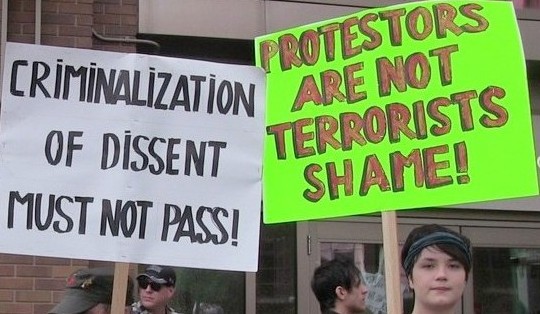 All of this talk about
the
dangers posed by foreign
interference takes the discussion about Canada's democracy down a
rabbit hole. It frustrates accountability and undermines the rule
of law by justifying exceptional measures and blocking the polity
from having a say in matters of concern. Most
importantly, it diverts the attention of the polity from the need
for the democratic renewal of the political process so that the
people can control the decisions which affect their lives. Nay
more, the domination of the polity by a political police makes
activities that take up the need to create new arrangements
potentially unlawful, notwithstanding claims that "legitimate"
opinion and "legitimate" dissent will be permitted. It creates a
system in which it is the political police who decide what is and
is not "legitimate," not the people.
All of this talk about
the
dangers posed by foreign
interference takes the discussion about Canada's democracy down a
rabbit hole. It frustrates accountability and undermines the rule
of law by justifying exceptional measures and blocking the polity
from having a say in matters of concern. Most
importantly, it diverts the attention of the polity from the need
for the democratic renewal of the political process so that the
people can control the decisions which affect their lives. Nay
more, the domination of the polity by a political police makes
activities that take up the need to create new arrangements
potentially unlawful, notwithstanding claims that "legitimate"
opinion and "legitimate" dissent will be permitted. It creates a
system in which it is the political police who decide what is and
is not "legitimate," not the people.
 All of it seeks to
justify
subjecting political parties and political opinion to security
checks
and assessments. It is anathema to a society that upholds freedom
of
political belief and conscience. The experience of CSIS security
clearances since 9/11 exposed how unjust the secret evidence
regime is
in security certificate cases. The right to know of those charged
as
well as the public was violated with impunity with serious
consequences
for which those responsible have yet to he held to account.
All of it seeks to
justify
subjecting political parties and political opinion to security
checks
and assessments. It is anathema to a society that upholds freedom
of
political belief and conscience. The experience of CSIS security
clearances since 9/11 exposed how unjust the secret evidence
regime is
in security certificate cases. The right to know of those charged
as
well as the public was violated with impunity with serious
consequences
for which those responsible have yet to he held to account.
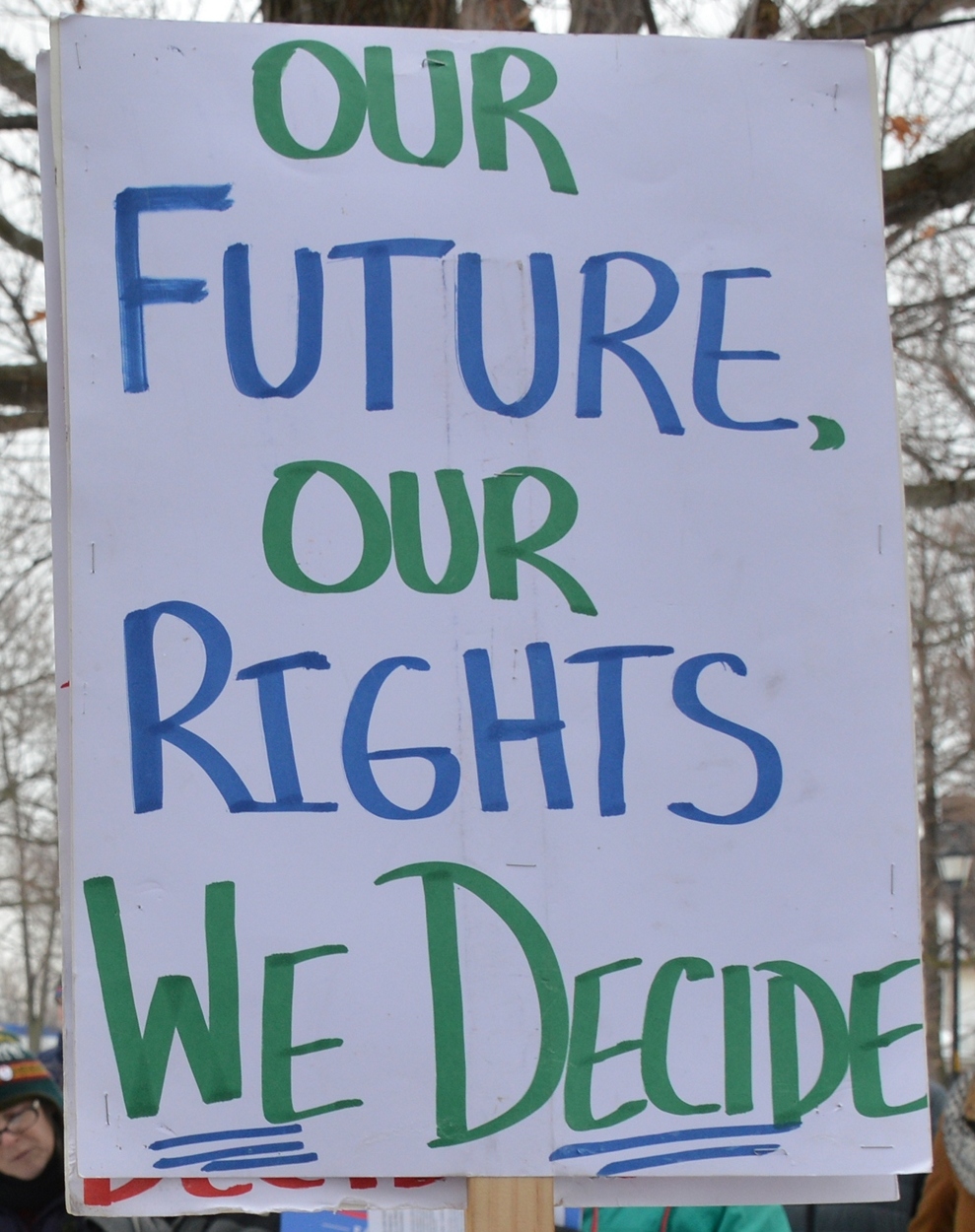 Whatever President
Trump
says has become the epitome of
irrationality. Uppermost on everyone's mind this year as Trump
delivered the State of the Union is government coercion and
control taking place at the border, in the prisons, and on the
streets against dissent: the dictate which has shut down
government, laying off thousands of workers, contract workers,
and
turning the lives of the most vulnerable in society upside down;
as well as threats to invade Venezuela; the announcement that the
U.S. is leaving treaties on nuclear weapons; and much more.
Whatever President
Trump
says has become the epitome of
irrationality. Uppermost on everyone's mind this year as Trump
delivered the State of the Union is government coercion and
control taking place at the border, in the prisons, and on the
streets against dissent: the dictate which has shut down
government, laying off thousands of workers, contract workers,
and
turning the lives of the most vulnerable in society upside down;
as well as threats to invade Venezuela; the announcement that the
U.S. is leaving treaties on nuclear weapons; and much more.  The reality of civil war was
further evidenced in the threat
Trump made: "An economic miracle is taking place in the United
States, and the only thing that can stop it are foolish wars,
politics or ridiculous partisan investigations. If there is going
to be peace and legislation, there cannot be war and
investigation. It just doesn't work that way."
The reality of civil war was
further evidenced in the threat
Trump made: "An economic miracle is taking place in the United
States, and the only thing that can stop it are foolish wars,
politics or ridiculous partisan investigations. If there is going
to be peace and legislation, there cannot be war and
investigation. It just doesn't work that way."